Injured On The Way to or From Work in Queensland: Your Rights and Entitlements
Knowledge Base
Getting injured on your way to or from work can be extremely stressful. Fortunately, in Queensland, you might be entitled to make both a workers' compensation and motor vehicle insurance (CTP) claim, depending on how your injury occurred.

Does WorkCover Cover Travel to and From Work?
Yes; in many situations , WorkCover Queensland (or your employer's self-insurer) may cover injuries sustained while travelling to or from work.
WorkCover claims can be made regardless of fault, so you can be entitled to claim even if there was no other party at fault, so long as your injury is taken to arise out of or in the course of your employment.
These are called "journey claims." Here's what you need to know:
- Eligible journeys: Generally, a journey claim is approved if your injury occurred while you were directly travelling:
- between your home and workplace; or
- between your home and a work-related training location (which you are required under your employment to attend); or
- If you have an existing injury and WorkCover claim - a journey between your home and a place to undertake rehabilitation, medical advice, or receive payment of WorkCover compensation; or
- between one place of employment to another place of employment.
Your “home” means your usual place of residence.
- Deviations and delays: Minor breaks or deviations from your standard route may not always affect your claim. However, an injury will not be “in the course of your employment” (or approved) if the accident happens during or after:
- a “substantial delay” before you start your journey; or
- a “substantial interruption or deviation” from the normal route from your home to the workplace - unless the delay or deviation occurs because of circumstances connected with your employment or out of your control
Your claim will also not be approved if you were contravening road rules, regulations or the law if that contravention was a major significant factor (e.g. speeding). Engaging in unrelated activities could also void your rights to claim.
What Does WorkCover Queensland Cover?
WorkCover Queensland can provide the following benefits if your journey claim is accepted:
- Medical and rehabilitation expenses: This includes costs for doctor's appointments, medications, treatment, and rehabilitation services.
- Weekly income replacement: If you're unable to work due to your injury, you may receive payments to replace a significant portion of your lost wages.
- Lump-sum compensation: In cases of permanent impairment, you could be eligible for a lump-sum payment.
How to Start a WorkCover Claim
- Seek medical attention: Get immediate treatment for your injuries and obtain a Work Capacity Certificate from your doctor.
- Notify your employer: Inform your employer about your injury as soon as possible and provide them with your Work Capacity Certificate.
- Submit your claim: Contact WorkCover Queensland or your employer's self-insurer to lodge your claim
Can I Make a Compensation Claim?
If another party's negligence caused your injury while commuting, you could be entitled to additional compensation through a so-called ‘common law claim’ via a personal injury lawyer. For example:
- Motor vehicle accidents: If you were injured in a car, truck, or motorcycle accident caused by another driver, you might be able to claim through their Compulsory Third Party (CTP) insurance.
- Public transport accidents: Injuries on buses, trains, or due to infrastructure issues could lead to claims against the transport operator.
- Cycling or walking accidents: You might have a CTP claim if a pedestrian or cycling accident was the fault of a motor vehicle driver.
Important points:
- Time limits: There are strict time limits for common law claims in Queensland, so it's crucial to seek legal advice as soon as possible.
- Legal Representation: It's highly recommended to get an experienced personal injury lawyer's expertise for common law claims to help build a strong case.
Disclaimer: This information is designed for general information in relation to Queensland compensation law. It does not constitute legal advice. We strongly recommend you seek legal advice in regards to your specific situation. For help understanding your rights, please call 1800 960 482 or request a free case review to talk to one of our lawyers today.
Car accident lawyers Brisbane
Car accident lawyers gold coast, related articles, what is maximum medical improvement (mmi).
Whether it's at work, on the road, at the hospital or in a public place, if you have been injured in Queensland due to the fault of another party, you may be entitled to make a compensation claim
Does WorkCover cover me if I’m working from another location?
How long do workcover payments last, if it's time to talk, we're here to help. get free advice direct from our solicitors today..

1800 700 125
Home > Guides > Does Queensland WorkCover apply when injured travelling to or from work?
Does Queensland WorkCover apply when injured travelling to or from work?
You could claim workers’ compensation in Queensland when you are injured travelling for work purposes, including travel to or from your workplace and other work-related trips.
When claiming personal injury compensation for work-related travel, you make a “journey claim”.
You could also have a WorkCover claim if your employer influenced your accident. For example, they asked you to travel quickly to meet a deadline, or they asked you to work long hours and then made you drive somewhere while you were fatigued.
When you are harmed during work travel overseas or interstate, you could have a valid journey claim if your job contributed significantly to your injury.
NOTE – if you have recently resigned from your employment, you could still be eligible for a journey claim.
What is a WorkCover journey claim?
A journey claim is a work injury compensation claim when a work travel accident causes you an injury. For example, you might have a car accident driving to or from your job while using your own or a company vehicle for work purposes. Journey claims are “no-fault”, so you do not need to prove who was liable for causing you harm.
How do I have a successful WorkCover work-related travel claim?
To have a successful WorkCover journey claim for work-related travel, you must:
- Be defined as a worker by the Workers’ Compensation and Rehabilitation Act 2003 .
- You must have already started your work trip without deviation or lengthy delays.
So, you don’t have a journey claim if you are injured at home before starting your trip to work. However, you could have a public liability claim if you are harmed while at another property (e.g., a privately owned property or rental dwelling).
There are other eligibility criteria, such as:
- You must lodge within the required time frame
- There was no illegal activity that facilitated the accident (like breaking road rules)
What if I am already on workers’ compensation and have a car accident?
Suppose you suffer a further injury while travelling to or from your medical or rehabilitation provider, and you are already receiving WorkCover payments . In that case, you will be entitled to make a journey claim for your loss.
You might also be eligible to make a common law claim, depending on the circumstances of your road accident and who was at fault.
What is the journey compensation claim process?
- Seek urgent medical attention and begin your recovery
- Retain an expert journey claim compensation lawyer. They will help you take the correct steps to achieve your desired outcome.
- Ensure you meet the legal definition of a worker. Splatt Lawyers will let you know this for free.
- Collect evidence – All compensation claims rely on expert assessments and reports, and your lawyer will work with you to create a compelling case.
WorkCover might reject your journey claim if:
- You committed an illegal act, and this contributed to your accident.
- There was a substantial delay prior to starting your journey
- There was a significant deviation or disruption to your trip
What compensation do I get for a journey claim?
When you are injured and can’t work but need to pay your bills and fund medical rehabilitation, your WorkCover benefits help pay your debts. When you have a successful compensation claim for a work-related travel accident, you could receive the following:
√ Weekly payments for your lost wages
√ Medical treatment expenses cover
√ Rehabilitation expenses reimbursement
√ Travel costs related to your medical care
When your injuries are stable and close to the end of the workers’ compensation process, you will receive a whole-person impairment assessment. You might be offered a WorkCover lump-sum payout. At this time, you must seek legal advice. Accepting the lump-sum offer will preclude you from making a common law claim.
More about WPI claims →
How can Splatt workers’ compensation lawyers help me?
Our experienced WorkCover lawyers have supported Queenslanders with work-related injury claims for nearly three decades. People love our 100% No Win, No Fee funding policy, which means;
√ It’s free to start your case
√ You pay our fees and costs when you win
√ Pay nothing if you lose
√ We fund your medical assessments and reports
√ We support your rehabilitation costs
Once we win your case, we recover these fees, but if you lose, you owe nothing. This is the Splatt Lawyer’s No Win, No Fee, No Risk guarantee. Call now 1800 700125 .
Get Started Now- It's Free
Disclaimer – This is general information only and does not constitute legal advice. It is free to receive legal advice on your situation. Please get in touch with our experienced personal injury compensation lawyers for help understanding your legal rights and your free claim review. Call 1800 700 125 or email: [email protected]
More Legal Advices
how long will my workcover payments last, get back on track with splatt lawyers.
Our friendly experienced lawyers love to help. Contact our team with your questions or start your claim online now. It costs nothing to understand your options.
Enter Email
Subscribe to our newsletter
- 1800 860 777
- [email protected]
- 69 Amelia St, Fortitude Valley QLD 4006
Legal Services
- Road Accidents
- Work Accidents
- Public Liability
- Serious Accidents
- Mental Illness
- Insurance Claims
- Professional Negligence
Service Areas
- Sunshine Coast
Quick Links
- Our Pricing
- Legal Guides
At the end of your visit today, would you complete a short survey to help improve our services?
Thanks! When you're ready, just click "Start survey".
It looks like you’re about to finish your visit. Are you ready to start the short survey now?
What to do in the event of an injury
If one of your workers suffers a work-related injury, they may be entitled to claim for workers' compensation. Queensland's statutory workers' compensation scheme is a no fault scheme (e.g. an injured worker is entitled to statutory compensation regardless of whether it is the worker's or the employer's fault that the injury occurred). Workers' compensation may include weekly compensation (for lost wages), medical/rehabilitation expenses, and reasonable travel costs.
Issues of fault and negligence (including contributory negligence by a worker) may be dealt with in a common law action for damages. Access to common law is available to all workers in Queensland who can prove negligence against an employer and who have a work-related injury. Damages may include compensation for pain and suffering or economic loss. The employer is covered for the cost by WorkCover Queensland through their accident insurance policy.
The injured worker needs to lodge a claim with WorkCover Queensland if their employer is not self-insured.
Work-related injuries
A work-related injury may include:
- a cut or fracture
- industrial deafness
- an injury sustained while travelling to or from work
- an injury while on a recess either at work or away from work
- psychiatric or psychological disorders such as stress or depression
- aggravation of a pre-existing condition
- death from an injury, disease or aggravation of a disease.
Lodging a workers' compensation claim
If one of your workers is injured, the following steps should be taken:
- The worker notifies you immediately.
- You assess the situation to make sure they're safe. Call 000 if it's an emergency.
- Check if you need to report the incident to Workplace Health and Safety Queensland .
- The worker sees a doctor to get a workers' compensation medical certificate.
- The worker lodges a claim with WorkCover Queensland .
If the injury results in a death, you must lodge a fatal injury claim with WorkCover Queensland by phoning 1300 362 128.
You must pay the worker for the day of the injury. This is separate to compensation paid from your insurance and must not come out of the worker's sick leave, holiday leave, or any other entitlements.
You will also need to pay an excess to WorkCover Queensland. This represents the first payment of weekly compensation.
The sooner a claim is lodged, the less it will cost you, as WorkCover Queensland can make a decision and start paying the claim sooner. WorkCover Queensland will then help your worker get back to work as safely and as soon as possible.
Rehabilitation for return to work
Workers' compensation laws require employers to participate in rehabilitation and return-to-work programs for injured workers.
Rehabilitation is designed to ensure workers a safe and early return to work. If you have an injured worker, they need to advise WorkCover Queensland when they intend to return to work. They may need to take part in a rehabilitation program, which could include medical treatments and alternative duties until they fully recover from their injury.
WorkCover Queensland provides information on injuries at work and the return to work plan .
Directors, partners or sole traders
Workers' compensation legislation does not cover directors, partners or sole traders, so it is not mandatory to have cover. To insure yourself against work-related injury or illness, read more about Workplace personal injury insurance .
Also consider...
- Learn more about how you can keep your workplace safe .
- Read about work, health and safety in Queensland .
- Last reviewed: 16 Jul 2019
- Last updated: 8 May 2018
- Print topic
A Comprehensive Guide to WorkCover Queensland Psychological Injury Support
work workersCompensation

Written by Talked Team
If you currently work in Queensland and have incurred a work-related psychological or mental injury, you may be eligible to claim WorkCover benefits, compensation, or support. However, the process of accessing support for these services is often complex and challenging to navigate, particularly for those who are seeking support for the first time.
In this article, we will outline a comprehensive guide to WorkCover Queensland and provide details on how you can best manage your workplace psychological injury to help make your recovery a little bit easier. Follow the step-by-step process outlined in our guide to ensure that you do not overlook anything so that you can access the support you need.
Table of contents
What is workcover queensland, what are mental and psychological injuries, common triggers of psychological injuries under workcover queensland, am i eligible to make a workers’ compensation claim for a psychological injury, can i claim for a psychological injury, do i need to provide evidence to make a mental injury claim, who administers queensland's workers' compensation policy, are there time limits for mental injury claims.
How do I make a WorkCover Queensland claim for a psychological injury?
Claims assessment and determination
Can i access psychology support during the assessment period, what happens after my psychological injury claim is approved.
Where can I find a WorkCover Queensland Psychologist?
Access additional mental health support
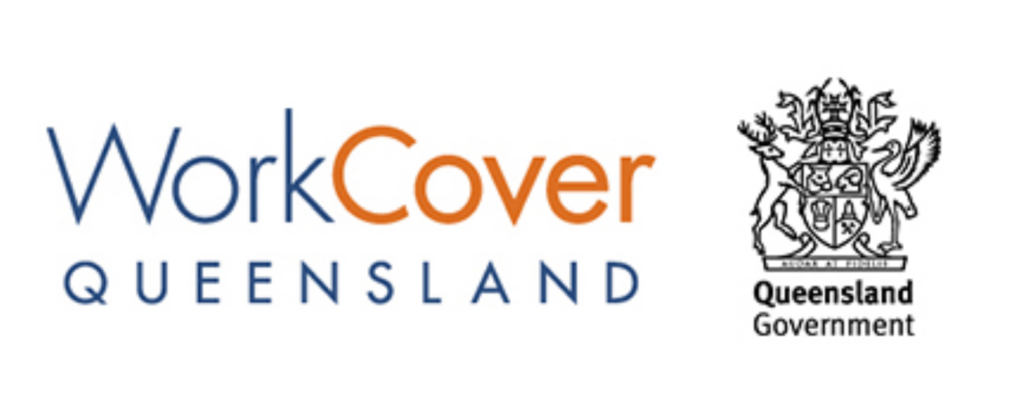
WorkCover Queensland is a workers' compensation scheme established and funded by the Queensland Government. It serves as the workers' compensation insurer for a majority of workers in Queensland. WorkCover Queensland provides eligible workers support, including access to psychological services, to assist employees in their recovery from workplace or work-related injuries. Injuries sustained can occur while travelling to, from, and between work and while performing work-related duties outside of their usual work site.
If you currently work in Queensland, please note that all Queensland employers must have a workers' compensation policy unless they are self-insured. This policy is generally taken with WorkCover Queensland. If your employer is self-insured (or group-insured) the process set out below varies according to the workers' compensation policy established by your employer. Self-insurers generally at a minimum have 2,000 employees. You can find a list of self-insurers here .
Injuries sustained at work are not limited to purely physical injuries. Often some circumstances mean that employees or workers incur a psychological injury. In Queensland, workers have the legal right to a safe and healthy work environment. As such, where an employer’s negligence results in harm regardless of whether this harm is physical or psychological, employees have a right to support.
This means that if you are diagnosed with a psychological or mental injury, or psychiatric disorder because of your job, you may be eligible to claim workers’ compensation under WorkCover Queensland. A claim for psychological injury may also be classified by a medical professional as a mental health or work stress claim. In the eyes of WorkCover Queensland, these claims are the same with the only difference being the type of disorder.
“ Work-related stress alone is unlikely to be considered a psychological injury. ”
Please note that job stress alone would not qualify as a workers' compensation claim. Recently, court findings outlined that everyone experiences work-related stress occasionally, and as such, it alone cannot be considered a psychological injury.
Examples of psychological or mental health disorders include:
Adjustment disorder
Anxiety disorders
Bipolar affective disorder
Dissociative disorder
Schizophrenia
Working with an experienced WorkCover Queensland Psychologist can help with understanding the scope of the injury and aid in the provision of ongoing support.
Get started with a WorkCover Queensland Psychologist

There are several incidents or actions that have resulted in successful workers' compensation claims in Queensland for mental health injuries. These injuries include:
Harassment or bullying from management, colleagues or clients
Negligent or toxic managers
Long work hours
Incomplete or insufficient onboarding and training
Undefined job descriptions
Traumatic event(s) occurring at work
Breach of WHS standards
Imbalanced workplace policies or procedures
Read more about work-related issues from our collection.
A Queensland-approved General Practitioner together with a WorkCover Queensland Psychologist can help you understand your psychological injury. Symptoms of these injuries can include anger , blurred thinking, social withdrawal, and fatigue .
You will be eligible to make a Workers' Compensation Claim from your employer if you are:
Full-time employee
Part-time employee
Casual worker
A subcontractor
This claim process can only commence once you have been diagnosed with a mental or psychological injury, and your job is a significant contributing factor to the diagnosis. Please note that having an existing psychological condition does not prevent you from accessing support. You may still have a successful psychological injury claim if your diagnosis worsens due to your work.
“ …having an existing psychological condition does not preclude you from accessing support ”
Meet the eligibility criteria? Start your WorkCover Queensland psychology sessions today.
To be eligible for a workers’ compensation claim in Queensland, you must ensure they satisfy the criteria set out in the Workers Compensation and Rehabilitation Act 2003. WorkCover Queensland will consider the following questions when you make a claim:
Has the claim been lodged within the statutory timeframe?
Was the worker employed by the employer when they sustained the work-related injury?
Is the worker actually considered to be a worker (as defined in the legislation)?
Was the workers’ job a significant contributing factor to their injury?

Successful mental health injury claims in WorkCover Queensland come off the back of compelling medical evidence. With the support of your treating GP and a WorkCover Queensland Psychologist or mental health therapists who assist with diagnosing and treating your condition, a strong claim can be built. WorkCover Queensland tends to provide more weight to a psychological or psychiatric assessment than one from a general practitioner.
Collecting this supporting information is dependent on you as you are the one bringing the claim forward.
Regardless of which workers' compensation policy your employer has chosen (e.g. WorkCover Queensland or through self-insurance), once you have lodged your workers' compensation claim, you will generally be allocated a Case Manager or Customer Representative. The Case Manager will be the point of contact for all communication for yourself, your doctors, psychologists and any additional support. If you
The role of a Case Manager will be to assist in the rehabilitation and return to work of employees who sustain physical or mental injuries at work. At their core, a Case Manager aims to process and assess claims, collect information and ultimately determine whether support is to be provided. This determination is a continuous process meaning that an approved claim can ultimately be terminated if the Case Manager deems it necessary.
Are you a Case Manager? Refer employees to Talked today.
WorkCover Queensland has strict timeframes for the lodgement of mental health claims. This is generally within six (6) months and there are minimal circumstances that allow an extension to the timeframe. There are also rare circumstances where WorkCover Queensland will wait this timeframe for psychological injury claims.
How do I make a WorkCover Queensland claim for a Psychological Injury?
The WorkCover Queensland claiming process is relatively straightforward, provided that you follow the following steps. WorkCover Queensland requires injured workers seeking to make a psychological injury claim to fill in and submit a claim form.
To put yourself in the best position to submit a successful Workers’ Compensation Claim in Queensland, completing the below steps can assist.

Step 1 – Seek medical support
Regardless of whether your injury is physical, psychological or both, it is important to seek treatment from a general practitioner (if possible, one who specialises in workers' compensation claims) about your work-related injuries. If you are looking for a GP who has this expertise, you can reach out to our WorkCover Queensland partner GP .
Your treating GP will generally issue you a Work Capacity Certificate (if not, we recommend that you request your GP prepare one). This Work Capacity Certificate will be important in the submission process as well as to assist with communication with your employer. A copy of an example Work Capacity Certificate can be found here .
“ During the WorkCover Queensland claiming process, some medical costs will be covered by the scheme. ”
The Work Capacity Certificate will include details about:
The injury that you have sustained
A proposed treatment plan
The capacity that you have for work
Your current functional ability
A proposed return to work plan, including any workplace modifications that may be necessary.
If you have experienced a psychological injury, and your doctor has made a consistent finding, your GP can make an initial recommendation of up to five (5) sessions with a qualified WorkCover Queensland psychologist . Note that you will only be able to access these initial sessions once your Case Manager has approved your claim.
In addition to these recommendation sessions, you can access one fully funded psychological support during the WorkCover Queensland assessment period, regardless of the outcome of your claim. You can read more on how to access this support below .
Step 2 – Inform your employer of the incident
This step may be made concurrently with Step 1 as there are time limits to making a workers’ compensation claim in Queensland (generally around 20 days).
All employers are required to have an injury register. By reporting your work-related psychological injury, your employer can maintain an up-to-date record. To assist your employer, they may request you complete an Incident Report. It is important to ensure that you maintain a copy of this report for your records. Note that it is important to be concise, accurate and honest when completing this Incident Report.
Step 3 – Lodge the claim with WorkCover Queensland
Once you have obtained your Work Capacity Certificate from your GP (as outlined in Step 1), you can submit your claim to WorkCover Queensland. This may be completed by:
Submitting the claim via the online WorkCover Queensland portal .
Calling WorkCover Queensland on 1300 362 128 and speaking with a member of the team.
Completing the claim form and either upload it using the WorkCover online service, fax it to 1300 651 387 or post the completed form to GPO Box 2459, Brisbane Qld 4001.
We recommend using the online WorkCover Queensland portal as the lodgment process is relatively straightforward so long as you ensure you have the following details on hand:
Your personal contact information, fullname and DOB. You will also be asked to provide your email address and mobile number.
Your employers' details including business name and location.
The Work Capacity Certificate (see Step 1 ) provided to you by your GP following your initial consultation.
Your bank account details. This information is necessary for any compensation payments that will be made by WorkCover Queensland.
A Tax File Number declaration . This is necessary for time loss claims.
Details about the injury or illness that you have sustained during the course of work, including any details about how and when the injury happened.
Once you have lodged your claim you will be provided with a claim number which you can use to keep track of the claims process through Worker Assist . Worker Assist is how you can communicate, lodge and provide updates with WorkCover Queensland.
Step 4 – Commence funded treatment
If your claim is successful, your psychology treatment along with any additional support recommended under your Work Capacity Certificate or as determined by your GP and Case Manager will commence.
Additionally, you may be compensated for the lost wages you have incurred because of your injury. Generally, your employer will pay for your first week's compensation afterwards WorkCover Queensland will manage payments afterwards.
Ready to commence psychology treatment? Book a session with a WorkCover Queensland Psychology session today.
Upon receipt of your workers' compensation claim, the Case Manager allocated to your claim by WorkCover Queensland will assess it to determine whether you are eligible to access paid support and compensation. It generally takes 20 business days for WorkCover Queensland to make this determination.
During the assessment process, the WorkCover Queensland team may contact your employer, doctor, current supports, and any witnesses to your injury.
If the Case Manager determines to approve your claim, you will be eligible to access compensation for your medical expenses, lost wages, and other related expenses. Additionally, you may also be able to access support to help you get back to work through methods such as rehabilitation and retraining. Case Managers can also refer to psychology practices who can offer support.
If the Case Manager determines to not approve your claim, you may be able to appeal the decision.
Yes, you can access support. WorkCover Queensland understands that where a person believes that they have suffered a psychological injury, accessing support immediately to commence the recovery process. However, note that this psychological support by a registered WorkCover Queensland psychologist will only be sufficient to fund one session.
“ Once you have submitted your claim and Work Capacity Certificate to WorkCover Queensland, WorkCover Queensland will fund one psychology session regardless of the claims outcome. ”
Access to this funded treatment can only occur once you have lodged your claim with WorkCover Queensland.
This funding can also be for:
GP appointments
Psychology or counselling sessions
Psychiatry appointments
Medication, such as antidepressants
If it is deemed necessary as part of your return to work, WorkCover Queensland can also support mediation services between a worker and their employer.
Please note that although WorkCover Queensland will endeavour to help support you as an injured worker in your recovery process, they will not cover the following:
In-patient hospital costs
Costs related to a hospital stay, such as nursing, or medications received in the hospital
If your claim is ultimately denied by WorkCover Queensland, any additional psychology sessions after the decision has been made will not be funded.
If following the assessment and determination process, your WorkCover Queensland Case Manager approves your psychological injury claim, WorkCover Queensland will commence funding your recovery and rehabilitation.
“ The recommended psychology sessions outlined in your Work Capacity Certificate will only be funded if they are completed within the timeframe set out by your Case Manager. ”
As flagged above in Step 1 , if your GP indicates in your Work Capacity Certificate that you have sustained a mental injury during the course of work and make a recommendation for psychology sessions, these sessions will now be funded. The maximum number of initial sessions a GP can recommend is five (5). Your Case Manager will set a time limit on when these funded psychology sessions must be used. This time limit is generally between three (3) to six (6) months. Any remaining sessions after the timeframe will no longer be accessible.
Once you have finished the initial recommended psychology sessions, your WorkCover Queensland psychologist will complete and submit a report to your Case Manager informing them of the next steps. This can include a recommendation for further psychology sessions or a recommendation that you are fit to return to work. If you have been recommended to receive further sessions, the Case Manager will assess the recommendation and make a determination.
Additionally, your Case Manager may request your WorkCover Queensland psychologist to prepare interim reports providing updates on your recovery status.
Start your WorkCover Queensland Psychology support today.
Where can I find a WorkCover Queensland psychologist?
You can access psychology support if you have submitted your claim along with your Work Capacity Certificate to WorkCover Queensland. To access this support you may need to request your GP to provide you with a referral letter to your chosen WorkCover Queensland psychologist. However, finding a psychologist available to help support you may be difficult as 1 in 3 psychologists in Australia do not currently accept new clients. Additionally, not all psychologists are registered with WorkCover Queensland and as such you will not be able to access funded support from them.
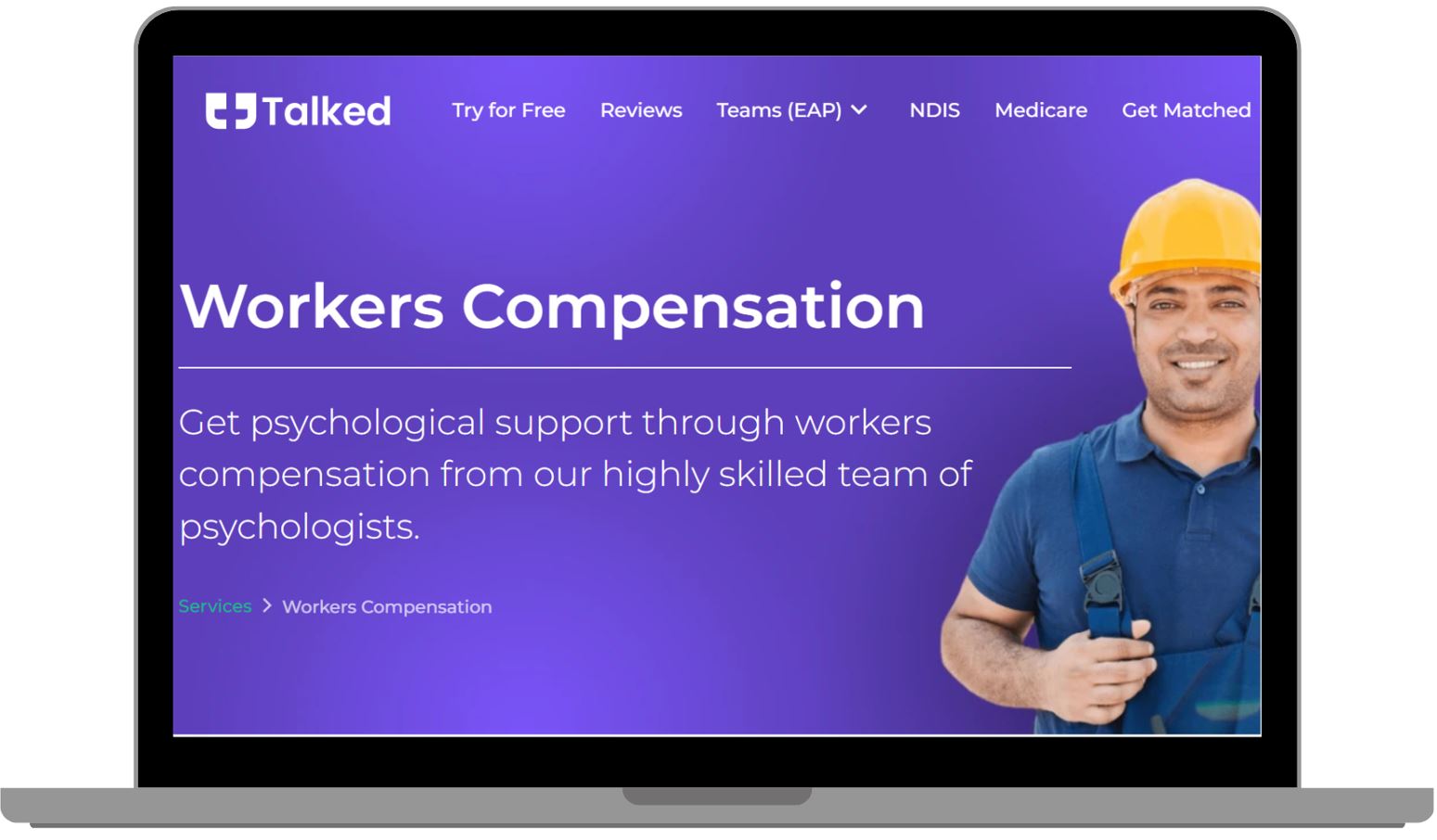
Luckily, Talked is a registered WorkCover Queensland psychology provider with several qualified WorkCover Queensland psychologists available in under 24 hours. If you wish to access support from one of our psychologists, we are happy to contact your WorkCover Queensland case manager to seek this approval and provide them with the GP referral.
Our psychologists can assist in your recovery, rehabilitation and ultimately, your return to work. These registered and clinical psychologists have extensive experience in providing services such as:
Cognitive behavioural therapy
Dialectical based therapy
Mindfulness based therapy
Each of these modalities, among others, has been shown to have efficacy in treating psychological conditions such as:
Talked psychologists understand that sustaining a psychological injury at work can make for a significant challenge. The role that a psychologist can play in the recovery process cannot be understated. During the recovery process coping strategies and skills that are developed in the sessions can help with:
Managing stress
Time management
Communication with colleagues and supervisors.
Get started today and reach out to Talked to start accessing psychology support for your mental health injury through your WorkCover Queensland claim.
If you are looking for additional resources to support your recovery, we have outlined several Queensland mental health injury support services that you can access.
Lifeline 13 11 14 Provides 24-hour crisis counselling, support groups and suicide prevention services.
Beyond Blue 1300 224 636 Aims to increase awareness of depression and anxiety and reduce stigma.
Workers’ Psychological Support Service 1800 370 732 A free, confidential and independent service available to Queensland residents who are struggling mentally due to a workplace injury.
Suicide Call Back Service 1300 659 467 A national 24/7 telehealth provider that offers free professional phone and online counselling for people living in Australia.
1300 MH CALL 1300 642 255 A confidential mental health telephone service for Queenslander residents that will connect you to public mental health services available near you.
QLife (LGBTIQ+) 1800 184 527
Kids Helpline 1800 55 1800. A free 24/7 online and phone counselling service for teens and young people aged up to 25.
For Aboriginal and Torres Strait Islander peoples
13 Yarn Crisis Support 13 92 76 24-hour crisis support for Aboriginal and Torres Strait Islanders.
Brother to Brother 24-hour crisis line 1800 435 799 Provides phone support for Aboriginal men who need someone to talk to about relationship issues, family violence, parenting, drug and alcohol issues or who are struggling to cope for other reasons.
WellMob Social, emotional and cultural wellbeing online resources for Aboriginal and Torres Strait Islander People.
Black Dog Institute offers a list of support services for Aboriginal and Torres Strait Islander peoples.
Domestic and family violence support
1800 RESPECT 1800 737 732. 24-hour national domestic, family and sexual violence counselling, information and support service.
Emergency service workers
National Emergency Worker Support Service Offers free and confidential mental health support for emergency service workers and volunteers (both active and retired).
Employee Assistance Programs
Many employers offer Employee Assistance Programs (EAPs) as a benefit to their employees. An EAP provides company-supported counselling. Reach out to your employer to explore whether they have an EAP. If not, you may want to recommend them Talked's best-in-class PAYG EAP offering.
Recommended Therapists Available Now

Social Worker
I'm a little unusual as a trauma specialist as I exist quite obviously outside the psychological arena and I don't make a point of pretending otherwise. As someone who ge... More

Psychologist
I'm a licensed psychologist both in Australia and Italy with more that 10 year experience providing mental health, psychosocial and clinical intervention in various commu... More

Hi, I'm an experienced Psychologist with a passion for helping people function at their best. I provide evidence-based psychological treatment to help people traverse and... More

Hi, I'm Robyn. I'm a Psychologist with 20 + years of experience in providing a variety of therapies and supports. I am warm and open in my approach, and I will work col... More
Book a FREE online therapy session with one of our top rated therapists

Manuela Sberna

Michael Hines
Essential reading, free mental health tests.
- Anxiety Test
- Depression Test
- Healthy Relationship Quiz
- Drinking Problem Test
- Self Esteem Test
Talked Services
- Best Rated Therapists
- Low Cost Therapists
- Psychologists Available Now
- Cognitive Behavioral Therapy
- Medicare Rebates Available
- Bupa Approved Therapists
- Telehealth Therapy Sessions
- In-Person Therapy Sessions
Find a Therapist
Get the help you need from a therapist near you .
Book a Therapy Session Today
Find a therapist and book your session online, helpful links, ready to take that first step.
If you are in a crisis, or experiencing suicidal or homicidal thoughts, contact 000 or your local emergency counselling service. Do not use this site to seek emergency help.
©2024 Talked Pty Ltd. ACN 640 295 272
Am I Responsible if My Employee Is Injured on the Way to Work?

By George Turnbull Legal Account Manager and Lawyer
Updated on January 31, 2024 Reading time: 5 minutes
This article meets our strict editorial principles. Our lawyers, experienced writers and legally trained editorial team put every effort into ensuring the information published on our website is accurate. We encourage you to seek independent legal advice. Learn more .
- What is Workers’ Compensation?
Differences Between the States and Territories
- Journeys for Work Purposes
- Key Takeaways
Frequently Asked Questions
Most employers are aware that employees who injure themselves at work may be a ble to claim compensation benefits. But what if an employee receives an injury on their way to work? Are you responsible for paying workers’ compensation? This article explains whether you are responsible if your employee receives an injury on their way to work.

As an employer, understand your essential employment obligations with this free LegalVision factsheet.
What is Workers’ Compensation?
If one of your employees has been injured in the workplace , you should immediately take action. Firstly, this involves helping them with any necessary first aid or medical treatment. You should also document the extent of the injury as well as what happened to cause it. Then, you should look into whether or not you will need to pay workers’ compensation. This is an amount you will have to pay to help your employee recover from their injury. This will usually involve reimbursing medical fees and a lump sum payment to compensate for loss of work. Ideally, this will help them get better and make a successful return to work.
No Compensation for Injured Employees
There are localised differences on whether or not you are responsible for an employee who receives an injury on their way to work. In South Australia , Tasmania , Western Australia and Victoria , employers will generally not be legally responsible. However, in Victoria , employees who receive an injury on their way to or from work can apply for compensation under a separate transport accident compensation scheme .
Possible Compensation for Injured Employees
However, the situation is slightly more complicated in New South Wales . Generally, you will not need to pay compensation for any injuries on a journey to or from work. This is unless there is a connection between their employment and the accident which caused the injury.
For example, this connection might be if your employee was:
- directed to pick up work mail on the way to work;
- directed to travel to a training course somewhere other than their typical workplace;
- travelling to meet a client; or
- involved in an accident that was caused by fatigue after completing a double shift.
Likely Compensation for Injured Employees
In the Northern Territory and the ACT , you will generally be legally responsible for your employees on their way to and from work.
Similarly, in Queensland , employers can be legally responsible for their employees while they travel to and from work. There are, however, several exemptions.
For example, in Queensland, an employee will not receive any workers compensation for injuries if they broke a road rule or criminal law while incurring the injury.
You will not be responsible for paying compensation if:
- the injury occurred too long before the employees’ work journey; or
- your employee had substantially deviated from their route to work.
Journeys for Work Purposes
Often, employees not only travel to and from work but also during the workday. Therefore, if your employee injures themself during the workday, you may be legally responsible. This means that you may need to pay worker’s compensation.
In most states and territories, what may constitute a work journey is relatively broad.
For example, it could include injuries incurred on journeys:
- during lunch breaks;
- on the way to a training conference;
- to receive a work certificate; or
- to client meetings.
Key Takeaways
In most of Australia, it is unlikely that you will be responsible for paying workers’ compensation if your employees receive an injury on their way to work. It is even more unlikely if your employee is injured as a result of their serious misconduct or by breaking the law. However, the laws surrounding needing to pay workers’ compensation differ between each state and territory. Either way, you must ensure that you have the appropriate level of cover and insurance so that you are adequately protected if any workers compensation claims arise.
If you have any questions about your employment requirements, our experienced employment lawyers can assist as part of our LegalVision membership. You will have unlimited access to lawyers to answer your questions and draft and review your documents for a low monthly fee. Call us today on 1300 544 755 or visit our membership page .
In NSW, you typically will not need to pay compensation for any injuries sustained on the way to work. However, you may be responsible if there is a connection between their employment and the accident which caused the injury. For example, if they are on their way to meet a client or have been directed to pick up a package on the way to work.
No, employers in Victoria will generally not be legally responsible if an employee is injured on their way to work.
We appreciate your feedback – your submission has been successfully received.
Register for our free webinars
Privacy law reform: how the proposed changes affect in-house counsel obligations, avoiding common legal and tax pitfalls for online businesses in australia, cyber attack how to prevent and manage a breach in your business, sealing the deal: in-house counsel’s guide to streamlining corporate transactions, contact us now.
Fill out the form and we will contact you within one business day
Related articles

Worker Injured on the Job? Here is What You Should Do.

Psychiatric Injury Claims and an Employer’s Liability

My worker has suffered a psychiatric injury – am I liable?

I Am an Employer. Can I Accept My Employee’s Heat of the Moment Resignation?
We’re an award-winning law firm

2023 Fast Firms - Australasian Lawyer

2022 Law Firm of the Year - Australasian Law Awards

2021 Law Firm of the Year - Australasian Law Awards

2020 Excellence in Technology & Innovation Finalist - Australasian Law Awards

2020 Employer of Choice Winner - Australasian Lawyer
Your guide to worker’s compensation claims in Queensland
Sunday March 17, 2024
Download as PDF

If you sustain a workplace injury in Queensland , in the midst of undertaking medical treatment and rehabilitation, there is the added stress of navigating the world of worker’s compensation claims. This blog is a guide for injured workers. We explore:
- who is covered for worker’s compensation in Queensland;
- lodging your worker’s compensation claim;
- what benefits are available;
- relevant timeframes for the worker to lodge a claim and the insurer to respond; and
- options to appeal a denied worker’s compensation claim.
CALL FOR FREE WORKERS COMPENSATION ADVICE: 1800 659 114
OR CLICK HERE TO EMAIL YOUR INQUIRY: [email protected]
Who is covered by the Queensland worker’s compensation scheme?
To determine your eligibility for worker’s compensation in Queensland, you are required to meet the following criteria:
- You are a worker in Queensland;
- You have sustained an injury;
- You were injured during the course of your employment; and
- Your employment was a significant contributing factor to your injury.
Please note that some workers who work in Queensland are covered under the Commonwealth worker’s compensation scheme, Comcare. You can read information about the Comcare scheme here .
Lodging your Queensland worker’s compensation claim
You should notify your employer of a workplace injury or illness as soon as possible after the accident or after any diagnosis of a work-related illness. You should complete an incident report and attend on your doctor or a hospital.
To lodge a worker’s compensation claim, you will need a “work capacity certificate”. This is a type of medical certificate specifically for worker’s compensation claims. It should be completed by your treating doctor.
Once you’ve notified your employer and obtained your work capacity certificate, you can lodge a worker’s compensation claim with WorkCover Queensland, either online here , or by calling them on 1300 362 128 . If your employer is self-insured, you can lodge your claim directly with them.
Tips before lodging your claim
- To claim worker’s compensation in Queensland, you need to be able to prove that an incident has occurred, causing injury (including psychological injuries and illnesses);
- Whether the injury you sustained is a compensable injury is defined under Workers’ Compensation and Rehabilitation Act 2003 (Qld) (“ the Act ”) as:
“… a personal injury arising out of, or in the course of, employment if the employment is a significant contributing factor .”
- A connection between the injury sustained and employment is paramount. If you get injured, your injury will generally be considered “work- related” if it occurred while you were working or because of your work. However, just because an injury occurs at your workplace, it does not mean it is because of your work. Similarly, if you are injured because of your work but outside of your workplace, your injury might be work-related.
- An injury includes an aggravation of a pre-existing injury (which need not be an injury resulting from your employment). Requirements for psychological injuries arising out of certain circumstances vary. You can read more about psychological injury claims in our blog, “I’ve suffered a psychological injury at work. What do I do?”
- The correct worker’s compensation medical certificate (a work capacity certificate) must have been completed by a medical practitioner;
- You should include any relevant evidence to support your application for worker’s compensation. For example, incident reports, medical reports and witness statements.
What worker’s compensation benefits are available in Queensland?
Injured workers in Queensland with an accepted worker’s compensation claim may be entitled to:
- weekly payments for loss of wages;
- reasonable medical expenses related to the workplace injury;
- lump sum compensation for permanent impairment; and
- travel expenses when travelling to/from medical appointments.
In addition to your statutory (no-fault scheme) entitlements, if your injury was caused by the negligence of another person or entity, you may also be entitled to common law damages.
Time limits for worker’s compensation claims in Queensland?
Under the Act, generally, an application for compensation should be lodged within 6 months after the entitlement to compensation for the injury arises. A WorkCover insurer, under certain special circumstances, may consider a late application.
If you’ve lodged a worker’s compensation claim outside the 6-month time limit and the claim has been denied, you should seek legal advice from a worker’s compensation lawyer.
GET ADVICE FROM A WORKERS COMPENSATION LAWYER: 1800 659 114
How long does the insurer have to make a decision on my worker’s compensation claim?
The WorkCover insurer has 20 business days to make a decision on your application, however, they may require more time to undertake further investigation or to obtain further information to assist in making a decision. The insurer has an obligation to communicate the outcome with you in writing.
Can I appeal an adverse decision on my worker’s compensation claim?
If your worker’s compensation claim is rejected, the WorkCover insurer must advise you of that decision (within 20 business days, as mentioned earlier, and they must also advise you of the reasons for denying your claim in writing.
If you disagree with the insurer, you are entitled to have the decision reviewed within 3 months of receiving the decision and reasons for the decision. You should seek legal advice from a lawyer experienced in Queensland worker’s compensation claims, if you wish to review an adverse decision.
Get help from a Queensland worker’s compensation lawyer
When considering lodging a worker’s compensation claim in Queensland, it is important to understand your eligibility to claim, provide all the necessary documentation and evidence (including your work capacity certificate) and be mindful of time limits. If you’re unsure of your rights and entitlements, or you’ve received an adverse decision from the WorkCover insurer at any time, you should seek legal advice.
Hall Payne’s worker’s compensation lawyers can assist you with any aspect of your claim, including any rights to pursue lump sum compensation for permanent impairment or a common law claim due to negligence.
Contacting Hall Payne Lawyers
You can contact us by phone or email to arrange your consultation; either face-to-face at one of our offices, by telephone or by videoconference consultation.
Phone: 1800 659 114 Email: [email protected]
This article relates to Australian law; either at a State or Federal level.
The information contained on this site is for general guidance only. No person should act or refrain from acting on the basis of such information. Appropriate professional advice should be sought based upon your particular circumstances. For further information, please do not hesitate to contact Hall Payne Lawyers .

Get in touch with today's blog writer: Fadzai Mudimu
Previous Blog Post Next Blog Post
This article relates to Queensland personal compensation. If you are seeking information about Queensland personal compensation law, click 'yes' to view the article.
We need to show you specific information for your location. please select your state:, if you would like to find out more about your rights and the process for making a personal injury claim, please answer ‘yes’ below., are you making a genuine enquiry about a personal injury, if you would like to find out more about your rights and the process for making a personal injury claim in queensland, please answer ‘yes’ below..
You're using an outdated browser. Please upgrade your browser to improve your experience.
Your browser has Javascript disabled. Some features may be limited.
- 1800 316 716

Road Accident Claims
For accidents that take place on the road, as a motorist, cyclist, or pedestrian.
Work Accident Claims
For accidents that happen at work or from work-related activities.
Silicosis Disease Claims
For silicosis and silica exposure-related illnesses.
Whiplash Claims
For whiplash injuries following a road accident or collision.
Asbestos Disease Claims
For asbestosis or illnesses related to asbestos exposure.
Public Place Injury Claims
For injuries following accidents that happen in public places.
Industrial Deafness Claims
For industrial deafness or occupational noise-induced hearing loss.
Institutional Abuse Claims
For compensation following abuse by institutions like schools or churches.
Super Insurance Claims
For assistance with Total and Permanent Disability (TPD) claims.
Medical Negligence Claims
For claims following negligence by medical professionals or hospitals.

Prefer to speak to someone directly?
- Claims Process
- No Win, No Fee
- Our Low Fees
- Meet Our Team
- What Our Clients Say
- Our Locations
- Book a free consultation
The latest industry insights into compensation law.
- Workers Compensation
- 6 December 2021
Common Questions About WorkCover Queensland Claims
We get asked a lot of questions from Claimants about WorkCover Queensland claims and their compensation entitlements.
The purpose of this article to answer some of the more commonly asked questions, which we hope might be useful to Claimants.
Can you claim WorkCover for a pre-existing injury?
If a worker sustains an injury during the course of their employment, they are entitled to lodge a WorkCover Queensland claim .
It is quite often the case that a worker might aggravate a pre-existing condition. For example, a Claimant may have had previous issues with their lower back in the past but at the time of a new work event, they were asymptomatic. If the worker then aggravates their lower back injury, say as a result of lifting something heavy, they are entitled to lodge a claim with WorkCover.
It will be important for the doctors to differentiate the extent of the pre-existing condition and the aggravation injury, together with the permanency of any aggravation injury.
It is often essential to have appropriate expert medico-legal evidence to properly address this.
We run a number of matters for Claimants who were asymptomatic at the time of the work event who then suffer from a permanent aggravation to a pre-existing condition. It is important to seek legal advice as early as possible with respect to any potential WorkCover claim.
It is also important to note that even pre-existing injuries that are symptomatic at the time of the work event can be compensable. If a work event has made the symptoms worse, this would still qualify as a compensable injury. Again, it is important to seek legal advice as soon as possible.
What Injuries can you Claim on Workers’ Compensation?
There are number of injuries that can be claimed under WorkCover Queensland. If a work-related injury or illness happens to you (if you are a worker) or to one of your workers (if you’re an employer), there are potential entitlements through WorkCover Queensland .
An example of some of the injuries that workers can claim under WorkCover are as follows:
- Psychological or psychiatric injury;
- Industrial deafness ;
- Work related respiratory diseases such as silicosis ;
- Critical injuries;
- Back injuries;
- Shoulder injuries; and
- Ankle injuries.
In certain circumstances, workers injured whilst travelling to or from work can also be compensated for an injury sustained. For example, if you were driving to work and were rear ended on the way to work, a Claimant would be entitled to lodge both a WorkCover Queensland claim and a CTP claim .
If a worker dies as a result of work, a family member who was dependent on the person who has died, such as their partner or children may be able to lodge a claim with WorkCover Queensland.
It is important to get immediate legal advice regarding compensation entitlements should a work-related injury be sustained.
How Long Does a WorkCover Claim Take to be Approved?
The timeframe for a WorkCover claim to be approved varies. The first step is to lodge a WorkCover Queensland Claim Form together with a Workers’ Compensation Medical Certificate completed by your treating doctor.
Generally speaking, WorkCover must then make a decision with respect to whether your claim is accepted or rejected within 20 business days of receiving your claim.
In certain circumstances, WorkCover may take longer to make a decision if there is outstanding information they require. WorkCover should be communicating this clearly with the Claimant. It may be the case that further information is required from the employer.
Can an Employer Dispute a WorkCover Claim?
An employer can dispute the acceptance of a WorkCover claim. If WorkCover accepts a claim, the employer is entitled to dispute that decision and they must lodge an appeal with the Workers’ Compensation Regulator (“the Regulator”) within 3 months of WorkCover making the decision to accept the claim.
WorkCover will notify you if your employer has taken such a step to lodge an appeal with the Regulator.
It is important to seek immediate legal advice regarding your entitlements should this occur. There are strict time limits involved in Regulator appeals and the Regulator will advise a Claimant of an appeal lodged by the employer and provide a right of reply. Again, this is where it is important to obtain legal advice so you are fully aware of your rights and entitlements.
How Long Do You Have to Lodge a Claim with WorkCover Queensland?
For an injury that occurs as a result of a single incident event, a claim with WorkCover Queensland must be lodged within 6 months of that event. This time limit is usually applied very strictly by WorkCover Queensland and it is important not to delay in lodging a claim if there is an entitlement.
Some injuries occur over a period of time, for example, heavy repetitive tasks at work being undertaken over a number of months resulting in a back injury. For an over period of time claim such as this, a claim with WorkCover must be lodged within 6 months of first attending on a medical practitioner. A medical practitioner can include doctors and nurses at a hospital and is not confined to your regular GP. It is therefore essential that a claim is lodged as soon as possible after the first consultation.
It is important that workers are aware there are also very strict limitation periods with respect to common law entitlements.
For a single event injury, a compliant Notice of Claim for Damages must be lodged within 3 years of the date of incident, failing which the claim may be statute barred.
For an over period of time claim the 3-year limitation date starts from the date the work was first subjected to the harm. There is the potential for this date to have occurred many years ago and outside of the 3 year limitation date. It is therefore essential to seek immediate legal advice regarding steps that may be taken to protect an expired or expiring limitation date.
- Posted 6th December 2021
- in Workers Compensation

Obligation free advice
Claiming compensation can be intimidating, but it doesn’t need to be. vbr Lawyers is the multi award winning firm that gets you real results. Lower costs, higher claims and unrelenting advocacy.
Digital Marketing by Excite Media
- Terms of Service
- Privacy Policy
State updated!
Start your free & no obligation claim check
Main murphy's law website form enquiry.
" * " indicates required fields

- No Win No Fee
- Switching to Murphy's Law
- Best Lawyers Awards
- Car and Road Compensation
- Cycling Compensation
- Work Compensation
- Public Place Compensation
- Medical Compensation
- Covid Vaccine Injury Compensation Claims
- Child Abuse Compensation
- TPD Claims Lawyers
How to Make a WorkCover Claim in Queensland
Table of contents.

The Queensland worker’s compensation scheme is designed so that injured workers can obtain support for their recovery, including through payment of medical expenses, cover for lost wages, and compensation for the impact a work related injury has had on their lives.
The scheme is also intended to achieve:
- improved worker safety
- prevention of injuries
- effective rehabilitation and return to work programs.
This is a straightforward guide to making a WorkCover claim for workers who have been injured and anyone supporting them.
Unsure of your rights after a work injury? If you’ve suffered an injury at work due and are unsure of your rights then you should seek legal advice. Our work injury compensation experts can provide free and no obligation initial advice on your rights and explain your options including whether a no win, no fee claim for a tax-free lump sum may be possible.

Unsure of your workers compensation rights. Get free expert advice now.
Who is entitled to make a workcover claim.
Workers are entitled to compensation where they have suffered a work-related injury or illness.
The law says that workers compensation can be claimed for an injury ,illness and/or death if it “arises out of, or in the course of, employment”. So, what does this mean?
Generally, an injury or illness will be considered to arise out of, or in the course of employment, if it happens while a worker is:
- at their place of employment
- somewhere else performing work duties, or because they are required to be there by their employer
- on a normal break during the workday
- travelling to or from their home to their workplace (such as a car accident on cycling injury )
- travelling to or from their home or workplace to a school or training course they are doing for work purposes
- on a journey between two workplaces
There is an additional requirement that the employment is a significant contributing factor to the injury if a claim is being made for an injury incurred at the place of employment or at another place performing work duties.
Step by step guide: making a claim to WorkCover Queensland

Obviously the first thing to be done after a workplace accident has nothing to do with claiming compensation – it is to make the workplace safe and to secure immediate medical treatment for the injured worker.
The injured worker:
- may be treated in hospital, if the injury is serious enough, or
- should consult a doctor for treatment.
If you have been injured, make sure all medical professionals are advised up front that the injuries or illness are work-related, and that a WorkCover claim may be made. This ensures that they keep suitable records for you to submit in the course of making your claim.
You should then take the following 8 steps to make your WorkCover claim.
- Advise your employer in writing about the accident and your injuries – if you are too unwell, someone can do this on your behalf.
Your employer may already know about the accident if it happened at work, but it’s still a good idea to confirm it in writing.
- Obtain a work capacity certificate from your treating medical professional, such as your GP or specialist. If you are treated in hospital, they can complete the work capacity certificate and forward it to WorkCover on your behalf (if you have told them it is a work-related injury).
The doctor will complete the certificate of capacity and can access guidance on how to do this effectively. For your information though, a work capacity certificate is a specific type of medical certificate that contains details about:
- the injured worker
- the injury and the circumstances in which it occurred
- what treatment plan is proposed by the doctor
- any limitations to physical functioning caused by the injury
- rehabilitation and return to work plans
- Submit the work capacity certificate to your employer and advise them that you will be making a WorkCover claim.
- Decide whether to make your claim to WorkCover, or to your employer . You would claim directly to your employer if they are self-insured.
How do I know if my employer is self-insured?
Most employers will be insured by WorkCover Queensland. Some, however, arrange their own workers compensation claims insurance and manage their own WorkCover claims. WorkSafe Queensland publishes a list so you can check if your employer is self-insured.
Some of the major employers on the list include:
- Brisbane City Council
- Wesfarmers - owners of Bunnings, Kmart, Officeworks and more
If your employer is not on that list, make your claim directly through WorkCover.
- Submit your claim
To submit your claim, you will need to complete an online claim , or submit a claim form
A claim must be submitted within 6 months of the accident, or the date you receive a medical opinion linking your injury or illness to your work. However, it’s best to get the claim submitted as soon as you can, because if it is approved you can start receiving payments to help with your medical expenses and to cover any lost wages.
It might assist with a smooth submission of your claim if you take a little time to gather the necessary information first. This information includes:
- Personal details, including bank account information to receive payments
- Employment details
- Details of the injury
- Your work capacity certificate
If for some reason you don’t have a work capacity certificate to attach to your claim form, you will need information about:
- When the certificate was completed
- Your treating doctor and their diagnosis
- Your capacity to work
- Future treatment required
In many cases your doctor will provide a clear statement linking your injury or illness to your employment. If this is not the case, you may need further evidence to establish your entitlement to claim. This might include:
- A statement by you about how the injury occurred, or the illness came about
- If there was an accident, statements from any witnesses about what happened
- A letter or report from a doctor, specialist or other medical professional linking the injury or illness to your workplace or the performance of your work duties.
Some types of claims, like psychological injury , industrial deafness, or workplace fatalities , will require more information than others. WorkSafe Queensland provides additional guidance for claims of these kinds.
- Provide further information to WorkCover Queensland or your self-insured employer if required.
During the claims assessment process, WorkCover (or a self-insured employer) may require additional information to determine your claim. It is best to provide the information as soon as possible.
You may also be required to have an independent medical examination.
If you are unsure about further information or assessment that has been requested, or unable to provide what is being asked of you, it may be worth seeking legal advice about your options.
- Consider the outcome of your claim.
WorkCover Queensland aims to provide a decision on claims within 20 business days, provided all the required information has been provided.
If your claim is accepted, you will receive certain support and payments – more information about these is available here .
- Consider all your options
A WorkCover claim is generally the most straightforward way in which to secure compensation for a workplace injury or illness. However, injured workers do have the option to make a compensation claim in the court, called a common law claim.
Some information is available from WorkSafe Queensland about the process and implications.
The seriousness of your injury will be medically assessed and the extent of any permanent impairment to your functioning will be determined. This is called a “DPI” or “degree of permanent impairment”, and is expressed as a percentage. Based on this, WorkCover will offer a lump sum payment.
If you thankfully have little permanent impairment, that is, a DPI less than 20%, you must choose whether to accept the lump sum payment or to make a common law claim. You cannot do both.
For those workers who are unfortunately more significantly impacted, with a DPI over 20%, you can accept the lump sum and still make a common law claim.
However, once you receive your Notice of Assessment and accompanying offer of lump sum compensation, it is vitally important that you seek legal advice immediately as to whether you should accept the assessment, reject the assessment or defer your decision. If you choose to accept the assessment and the accompanying lump sum offer, you will very likely lose your rights to pursue a common law claim for that injury.
You only have 20 business days in which to make a decision once the Notice of Assessment is issued. As such, you should seek legal advice immediately once you receive your Notice of Assessment.
You can always seek advice
The steps to make a WorkCover claim are relatively straightforward, and there is much helpful information published by the government and available on the internet at the links referred to above. However, many injured workers still appreciate the assistance and advice of a lawyer experienced in workers compensation claims.
This is especially the case if you reach the point of considering whether to accept a WorkCover lump sum payment or to pursue a common law claim.
How helpful was this article
Thank you for your feedback.

Step-by-Step Guide: How to Lodge a WorkCover Claim in QLD with Ease
Tina veivers.
- December 23, 2023
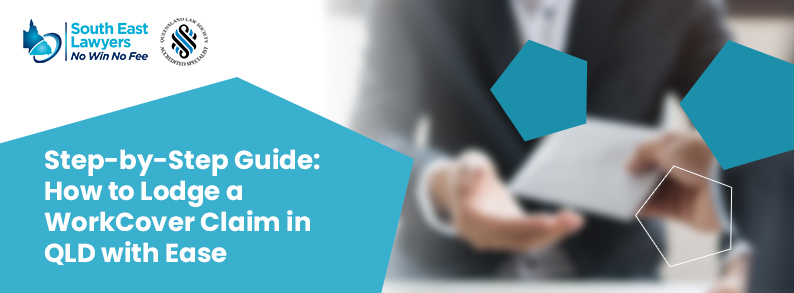
Home » Blog » Step-by-Step Guide: How to Lodge a WorkCover Claim in QLD with Ease

DIRECTOR / LAWYER QUEENSLAND LAW SOCIETY ACCREDITED SPECIALIST
Tina is the director of the firm and a lawyer who has 20 years of experience running and managing compensation claims for Plaintiffs. In contrast to the industry standard of larger compensation firms, Tina is a strong believer in ensuring that plaintiffs receive the vast majority of any settlement payout they do receive and will often reduce fees to ensure this occurs. In her spare time, Tina enjoys going to the beach and enjoying time with her family.
Have you ever been injured at work and wondered how to navigate the complicated maze that is the workers’ compensation system? You’re not alone.
Every year, countless workers in Queensland find themselves in this exact situation. But there’s good news: understanding and managing a WorkCover claim doesn’t have to be a daunting journey. Armed with the right information on how to lodge a WorkCover claim in Queensland, it’s a path that can be navigated with relative ease. Let’s unravel this complex process together, step by step.
Key Takeaways
- WorkCover Queensland provides coverage for employees injured at work, including various medical expenses and wage losses. Initiating a claim involves promptly seeking medical attention, notifying the employer in writing, and lodging a claim with WorkCover QLD.
- All employees in Queensland are covered by WorkCover for work-related accidents, including travel and work-related activities. However, volunteers may not be eligible.
- After a claim is lodged, WorkCover assesses it based on medical reports, wage verification, and other evidence. If approved, claimants receive weekly compensation payments calculated based on wages before the injury.
- Effective claim management includes verifying the accuracy of compensation payments and cooperating with WorkCover throughout the recovery process. A safe and gradual return to work is encouraged, with WorkCover supporting necessary medical treatments and workplace adjustments.
- If a claim is denied, understanding the reasons for denial, and seeking legal advice from experienced workers’ compensation lawyers , like South East Injury Lawyers, can be crucial.
Understanding WorkCover Queensland
WorkCover Queensland provides support and hope for employees who have suffered work-related injuries or illnesses. As a workers’ compensation insurance provider, it serves Queensland employees who have experienced a work-related incident by providing them with benefits. Every employer is mandated to possess WorkCover insurance, making it a ubiquitous part of the employment landscape.
When an injury at work occurs, it’s not just a race against time for recovery, but also to report the injury to WorkCover Queensland. As the workers compensation regulator, WorkCover allows notifications through various accessible means – online, via phone, or through the mail. But remember, the key aspect here is promptness. The sooner you notify, the sooner you can claim.
Who is Covered by WorkCover?
So, who exactly is covered by WorkCover Queensland? The answer is simple: all employees. WorkCover’s coverage is broad, offering protection for work-related accidents, including those happening during travel to or from work and while carrying out work-related activities. This coverage applies to both self-insured and non-self-insured employers, ensuring a broad safety net for all Queensland employees.
However, there is a catch. Volunteers, despite their invaluable contributions, unfortunately may not qualify for coverage under WorkCover Queensland. You can find out from WorkCover if the organisation you volunteer for is eligible.
So, if you’re a worker in Queensland, WorkCover has got you covered. But remember, it is always advisable to clarify your eligibility status with your employer or WorkCover Queensland directly.
What is Covered by WorkCover?
WorkCover’s protection extends beyond injuries to also cover the ensuing financial burdens, including medical expenses. Once a claim is approved, WorkCover intervenes to offer weekly payments and meet various medical costs. Lost wages, physiotherapy, rehabilitation, surgery, and any other necessary assessments or treatments are covered, ensuring that the road to recovery isn’t marred by financial hurdles.
However, while WorkCover’s coverage is comprehensive, it does have its limits. Certain services such as:
- massage therapists
- natural therapists
- pilates instructors
- personal trainers
- naturopaths
- acupuncturists
are not usually covered. Therefore, it’s important to be aware of what treatments are covered and plan your recovery accordingly.
Initiating a WorkCover Claim
Following a work injury, it’s important to start your WorkCover claim promptly. Seeking immediate medical attention is the first step. Taking this action can be essential to your health and wellbeing. also, isn’t just a crucial step for your health but also for your claim, as a medical certificate or report from your treating doctor is a necessary component of the claim form.
Once your health is taken care of, the next step for an injured worker is to notify your employer about the injury. This should be done in writing and include details of how and when the injury occurred.
Finally, lodge a WorkCover claim with WorkCover Queensland either online, by phone, or by mail. The claim should provide detailed information about your injury, employment, and medical status. Although this process may appear complicated, it’s a required route to securing your rightful compensation.
Seek Medical Attention
When a work-related injury occurs, your first priority should be your health. Seeking immediate medical attention is not only crucial for your recovery but also for your WorkCover claim. A timely visit to the doctor helps prevent your injury from worsening and ensures prompt treatment. More importantly, it allows for accurate documentation of your injury, which is key for your workers’ compensation claim.
A Work Capacity Certificate from your doctor is necessary to back up your claim. This certificate should confirm that the injury is work related. It’s essential to consult with a medical professional before notifying your employer about the injury. Remember, WorkCover can reimburse you for initial emergency medical treatment costs, so don’t hesitate to seek immediate medical attention if required.
Notify Your Employer
The sooner you notify your employer, the better. Delay can lead to complications in your claim process. If your employer fails to acknowledge your injury, you have the right to notify the Workplace Health and Safety Queensland (WHSQ) immediately. Your employer is legally obliged to support you through this process and ensure that your rights to access workers’ compensation are upheld.
Complete the Claim Form
Once your employer is notified, the next step is to lodge your WorkCover claim. You have multiple options to do this. You can either do it online, by phone or by mail. The claim form requires detailed information about your injury, your employment, and your employer. You must submit a medical certificate or report from your doctor as evidence. This must include details of treatment, diagnosis and test results from any tests performed.
Submitting a WorkCover claim can be a daunting task, but it doesn’t have to be. By providing accurate and detailed information, you can ensure your claim is processed smoothly. Remember, the more information you provide, the easier it will be for WorkCover to assess your claim.
One way to ensure that your claim meets all of the requirements and improve your chances of success is by engaging the services of a workers compensation lawyer. We can provide legal advice, ensure that you are including the correct information in your claim and that you won’t become a victim of common workers compensation pitfalls.

Navigating the Claims Process
After lodging your claim, the subsequent step involves working through the claims process. This involves:
- Understanding how WorkCover assesses your claim
- Understanding how compensation payments are calculated and disbursed
- Cooperating with WorkCover and providing any necessary information or documentation during this process.
WorkCover adheres to specific guidelines and procedures when assessing claims. This process includes examining the details of your case and reaching a decision grounded on the evidence given. This may seem like a daunting process, but understanding how it works can make it much more manageable.
WorkCover’s Assessment and Decision
WorkCover’s assessment process begins once your claim is lodged. They review your claim based on established guidelines and procedures. This involves:
- Examining your medical reports
- Reviewing your work capacity certificate
- Reviewing any other evidence you’ve provided
- Verifying your wages and the circumstances of your work-related incident with your employer.
Following this thorough assessment, WorkCover makes their decision. This careful and critical process helps guarantee fair and accurate evaluation of all claims. Remember, WorkCover’s decision is made based on the evidence presented, so it’s crucial to provide as much accurate and relevant information as possible.
Receiving Weekly Compensation
If your claim is approved, you will likely be entitled to weekly compensation payments. These payments are calculated based on the wages you received from your current employer in the 12 months prior to the injury. This is where your employer’s verification of your wages comes into play, as well as the importance of workers’ compensation claims.
These weekly compensation payments are taxable and are designed to replace the income you’ve lost due to your injury. If you have any questions or concerns about your compensation payments, our workers’ compensation lawyers can review your case. There may be certain circumstances that impact the payment amounts you may be eligible for.
Managing Your WorkCover Claim
Managing your WorkCover claim effectively is key to ensuring a smooth claims process. This entails knowing how to safely resume work and verifying the accuracy of your compensation payments. It’s important to remain proactive and involved throughout the claims process. This will not only aid in your recovery but also ensure you receive the compensation you’re entitled to.
Remember, even if your claim is approved, your journey isn’t over. You’re entitled to support from your employer and WorkCover throughout your recovery. This includes access to rehabilitation and return to work services. Active management of your claim can help ensure a smoother, less stressful recovery.
Returning to Work
Returning to work after a work-related injury is an integral part of the recovery process. It’s about more than just resuming your normal routine; it’s about restoring your sense of normalcy and working towards a full recovery. However, it’s vital to guarantee a safe return to work at a pace compatible with your recovery.
WorkCover Queensland is committed to supporting you through this process. They provide resources and support to help you return to work safely. This includes helping you access medical treatment and rehabilitation services, as well as making any necessary workplace adjustments. Remember, returning to work is a collaborative process, and both you and your employer have a role to play in ensuring it’s a successful one.
Ensuring Accurate Payments
Verifying the accuracy of your WorkCover payments is as important as managing your claim. WorkCover will provide you with a payment schedule that outlines the amount and frequency of your payments. It’s your responsibility to ensure that these payments are accurate and reflect the compensation you’re entitled to.
If there are any changes to your payment schedule or if you notice any discrepancies in your payments, it’s important to communicate this to WorkCover as soon as possible. Also, remember to keep records of all your payments and any changes to your payment schedule. This can be a valuable resource if any issues arise with your payments in the future.
Handling Claim Denials or Rejections
Unfortunately, not all WorkCover claims are approved. If your claim is denied or rejected, it’s important to understand why this has happened and what steps you can take next. This is where understanding the common reasons for claim denials and seeking legal advice can be invaluable.
A claim denial might seem like a major hindrance, but it’s not the final hurdle. In fact, it can be an opportunity for a more thorough investigation of your claim and improved chances of success. So, if your claim is denied, don’t lose hope. There are still steps you can take to pursue your workers’ compensation.
Reasons for Denial
There are several common reasons why a WorkCover claim might be denied. These can include:
- The claim wasn’t submitted within the prescribed timeframe
- The injury didn’t occur at work or during work-related activities
- There wasn’t enough evidence to support the claim
Understanding these common denial reasons can assist in identifying any possible problems with your claim. If your claim has been denied, it’s important to review the reasons given and consider whether additional evidence or information could help strengthen your claim. Remember, a denial isn’t necessarily the end – it’s an opportunity to review and strengthen your claim.
Seeking Legal Advice
If your claim is denied, it may be beneficial to seek legal advice. At South East Injury Lawyers , we are experienced injury and compensation lawyers who can assist with denied or rejected claims. We can provide legal advice and representation to ensure your rights are upheld and that you receive the compensation you’re entitled to.
Legal advice could be of particular value if your claim involves complex matters or if you’re uncertain about the next steps. Even if you’re confident in your ability to manage your claim, a legal professional can provide valuable insight and guidance. Remember, you don’t have to navigate this process alone. Support is available, and it’s okay to ask for help.
If you’re not ready to get in touch with us just yet, you can check out these related links, including further information regarding workers comp claim denials and the role of a personal injury lawyer in workers’ compensation matters .
Common Injuries and Common Law Claims
WorkCover encompasses a variety of injuries, from physical injuries to psychological distress. Knowing what injuries are covered can assist in determining your eligibility to make a claim. Additionally, in some cases, you may be able to pursue common law damages, which can provide additional compensation.
Whether you’re dealing with a physical injury or psychological trauma, it’s important to understand your rights and options under WorkCover. This includes knowing what types of injuries are covered and how to pursue common law damages.
Types of Injuries Covered
WorkCover covers a wide range of physical and psychological injury or illness caused by work-related accidents or events. This includes injuries like cuts and lacerations, burns, fractures, and psychological conditions like depression, anxiety, adjustment disorder, and post-traumatic stress disorder.
While WorkCover’s coverage is wide-ranging, it’s important to note that not all injuries are covered. For instance, injuries that are not directly related to your employment or that occur outside of work may not be covered. It’s always advisable to check with WorkCover Queensland or a legal professional if you’re unsure whether your injury is covered.
Pursuing Common Law Damages
In some cases, you may be able to pursue a common law claim in the form of common law damages in addition to your WorkCover claim. Common law damages are a type of compensation that you can claim if you can prove that your employer was negligent, and that this negligence caused your injury. Pursuing common law damages can result in a lump sum compensation payment, which can provide additional financial support during your recovery.
To pursue common law damages, you must first have an accepted statutory claim. From there, you’ll need to navigate the process of statutory claims, which involves:
- Collecting evidence
- Notifying WorkCover
- Proving a breach of duty
- Either negotiating a settlement or proceeding to court
It’s a complex process, but with the right support and advice, it’s a path that can lead to a successful outcome. In this situation, we highly recommend engaging the services of a personal injury and workers compensation lawyer.
Manage Your Workers’ Compensation Claim with South East Injury Lawyers
Navigating and managing a WorkCover claim doesn’t have to be a daunting process. With the right knowledge and support, you can successfully navigate the claims process, manage your recovery, and ensure you receive the compensation you’re entitled to. Remember, whether you’re dealing with a physical injury or psychological trauma, support is available and it’s okay to ask for help.
If you’re looking for a workers’ compensation lawyer in or around the Brisbane area of Queensland, get in touch with us here at South East Injury Lawyers . Our legal services are available on a no win no fee basis and we pride ourselves on ensuring our clients receive the compensation and entitlements they deserve.
Call us on 1300 446 999 or book a case review online here .
Book your free initial advice
If you’ve been hurt, you need to act fast. Get started immediately with expert advice from a leading compensation lawyer today.
You might also like
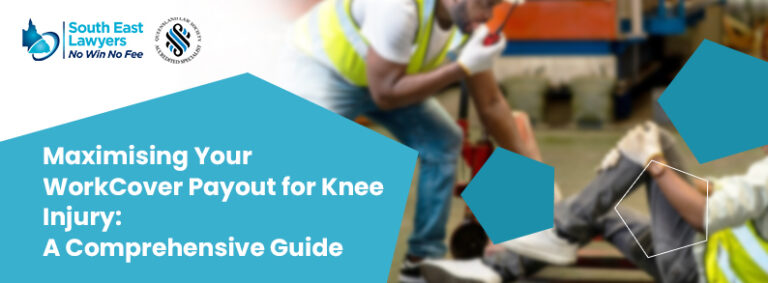
Maximising Your WorkCover Payout for Knee Injury: A Comprehensive Guide
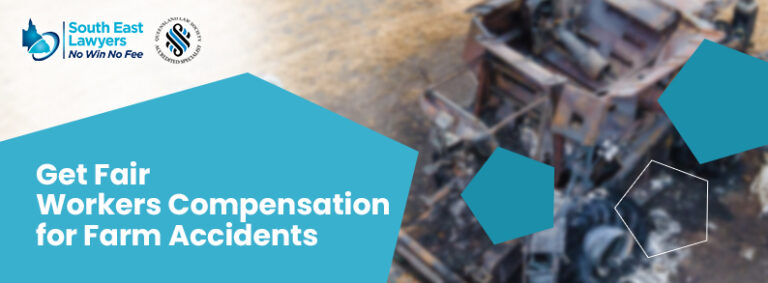
Get Fair Workers Compensation for Farm Accidents

Workers Compensation and Psychological Injuries in Queensland

Our Offices
- +61 75594 8460
- PO Box 269, Springwood, QLD 4127
- 07 5594 8460
- Terms of Use
- Privacy Policy

The Ultimate Guide to WorkCover Claims in Queensland
Individuals who sustain injuries while working in Queensland have the option to make a WorkCover claim. Despite this, the process of making a claim may prove daunting and convoluted.
Ascent Lawyers offers a comprehensive guide to assist individuals through the entirety of the claim-making process for WorkCover claims in Queensland. The guide covers everything from defining what a WorkCover claim is and who may be eligible, to providing instructions on initiating the claim process, and outlining what benefits those eligible may receive.

0. What is WorkCover?
WorkCover can be interpreted as a form of insurance for workers who are injured at work. It is designed to protect employees and employers alike by providing financial support for injured workers while also ensuring that employers are not financially burdened by workplace injuries.
All employers are required by law to take out a WorkCover policy to cover their employees in the event of a workplace injury or illness.
Generally speaking, for most claims there are two stages, the first stage is the Statutory Claim, and the second stage is the Common law Claim.
1. The Statutory Claim
In Queensland, the statutory claim process is designed to be simple and straightforward, with the aim of providing injured workers with prompt access to medical treatment and other support services.
1.1 How to make a WorkCover claim

Step 1: Report the injury to the employer
- The injured worker should report the injury to their employer as soon as possible.
- It is recommended that the injured worker reports their injury to the employer in writing.
Step 2: Completing a work capacity certificate
- The injured worker must submit a work capacity certificate .
- This certificate can be completed by their treating GP.
- In some circumstances, if the injured worker was taken to a hospital as a result of a work injury, the hospital can also complete a Work capacity certificate on their behalf to help initiate the claim process.
Step 3: Lodge the claim
There are multiple ways in which the injured worker can lodge a claim:
- Online claim : The fastest and easiest method is for the injured worker to complete and submit an online claim.
- Phone : The injured worker can call 1300 362 128 and talk to a member of the WorkCover team.
- Claim form : The injured worker can complete a claim form and either upload it using the WorkCover online service, fax it to 1300 651 387, or post the completed form to GPO Box 2459, Brisbane Qld 4001.
It is important to note that these options might vary if the injured worker’s employer is self-insured.
If the injured worker requires professional guidance and support throughout the WorkCover claim process, it is highly recommended to reach out to Ascent Lawyers . With their expertise in handling workers’ compensation cases, Ascent Lawyers can provide the injured worker with the necessary legal assistance to ensure their rights are protected.
1.2 Who can make a claim?
In Queensland, most workers are covered by the WorkCover system, including:
- Employees (full-time, part-time, and casual)
- Apprentices
- Unpaid interns
- Contractors and subcontractors (in some cases)
The Workers’ Compensation and Rehabilitation Act 2003 defines a worker as an individual, who works under a contract, and is an employee for the purpose of assessment for PAYG withholding.
This definition of worker can often include sole traders or contractors. There are many factors to consider.
To determine eligibility as a worker and entitlement to compensation, Ascent Lawyers invites individuals to take the Worker Determination Test . The experienced team at Ascent Lawyers will carefully review their circumstances and assess their eligibility for a claim.
If any injured worker’s employer prevents the worker from making a claim, the injured worker can make the claim no matter what attitude the employer hold! Ascent Lawyers can help injured workers with Standing Up for Your Rights: Pursuing Workers Compensation Despite Employer Resistance.
1.3 When to make a statutory claim?
As outlined in section 131 of the Workers’ Compensation and Rehabilitation Act of 2003 (Qld), WorkCover claims must be lodged within six months of the injury occurring.
However, there are a few exceptional cases where this time limit may be extended, such as making an error or having specific medical conditions that are determined by a Medical Assessment Tribunal.
Therefore, it is crucial that injured workers avoid any delays in submitting their claim to avoid the risk of forfeiting their right to make a claim.
With the strict time limits in place for submitting a WorkCover claim, it is important for injured workers to seek legal advice as soon as possible to avoid the risk of losing their right to make a claim. Contact Ascent Lawyers today to schedule a consultation and get the legal assistance you need to navigate the workers’ compensation system.
1.4 How is a claim decided?
In order to determine whether a claim is valid, WorkCover assesses a number of criteria laid out in the Workers Compensation and Rehabilitation Act 2003 . These criteria include factors such as
- whether the claim was made within the appropriate timeframe;
- whether the person making the claim was employed by the relevant employer at the time of the injury; and
- whether the injury was caused by a work-related incident.
However, each claim is unique, and additional criteria may be applied depending on the circumstances of the injury. For example, claims involving psychological or psychiatric injuries, industrial deafness, or latent onset illnesses may require more information to be assessed.
1.5 How long does it take Workcover make a decision?
WorkCover aims to make a decision on claims within 20 business days of lodgement, although this may take longer in cases where additional information is required. In such cases, the claimant will be notified and given reasons for any delay.
1.6 If the claim is denied
If WorkCover rejects a claim, WorkCover will provide written reasons. Injured workers can ask for a review of the decision by the Workers Compensation Regulator . Additionally, workers can provide feedback to WorkCover if they have concerns about the claim’s management.
For injured workers facing the disheartening situation of a denied claim, finding the right guidance and support is crucial. Ascent Lawyers stands ready to offer the expertise needed to navigate this complex process.
1.7 If the claim is accepted

1.7.1 What WorkCover Covers
Once WorkCover completes the assessment process and have decided to accept the claim, eligible injured workers can take comfort in the assurance that a wide range of payments and steadfast support is readily available to them. Workcover will be able to provide the following support:
- Lost Wages ( Weekly Compensation )
- Medical and Rehabilitation Costs
- Travel Expenses
- Permanent Impairment Lump Sum
- Death Benefits and Funeral Costs
In addition to financial support, WorkCover may be able to provide additional support to help the injured worker get back to work. The following programs are available:
- Return to Work Program
- Employment Connect Program
1.7.2 What WorkCover Does Not Cover
While WorkCover provides a range of support, there are some things that are not covered . These include:
- Damage to Clothing or Jewellery
- Damage to Cars
- Unapproved Hospital Costs
Ascent Lawyers diligently advocate for injured workers, ensuring they receive the compensation they deserve to cover lost wages and essential expenses. Let us navigate the legal complexities, address payment delays, disputes, and insufficient adjustments on your behalf. Take the next step towards securing your financial well-being and a smoother recovery. Contact Ascent Lawyers today and let us fight for your rightful weekly compensation.
1.8 Notice of Assessment / Lump sum payment
1.8.1 requesting an independent medical examination.
According to Section 178 of the Workers Compensation and Rehabilitation Act 2003, workers with accepted compensation claims have the right to request an independent medical assessment by WorkCover.
It is important to note that if the assessment request is not made within three years of the injury event, the injured worker may lose the opportunity to pursue a higher compensation claim through common law (this is when the claimed amount is much higher)!
Take a look at this article: Why You Must Secure Your WorkCover Claim with a ‘Notice of Assessment’ !
1.8.2 Degree of Permanent Impairment
WorkCover QLD will only offer the injured worker a lump sum payment, if the injured worker has suffered a permanent impairment. In practical terms, this means that for every 1% of DPI, an injured worker is entitled to receive $3,612.73. (1% * $361,273.10 = $3,612.73)
We have prepared a table for you to review, so you can easily understand the lump sum payment.
Some people may be disappointed with the determined degree of permanent impairment, which can sometimes be 0%. This means that the accompanying letter will confirm that they are not eligible for a lump sum offer of compensation.
Regardless of the degree of permanent impairment (DPI) indicated in the Notice of Assessment, Ascent Lawyers recommend to never accept the offer until legal advice has been sought.
1.8.3 What are the options?

In cases where the injured worker’s Degree of Permanent Impairment (DPI) is less than 20%, they must make an irrevocable choice:
- accepting a lump sum payment offered by WorkCover and finalising their claim, OR
- making a common law claim.
If the injured worker’s DPI is higher than 20%, they may accept the lump sum offer AND pursue a common law claim, which typically involves a much higher compensation amount.
WorkCover Qld will provide the injured worker with a lump sum offer via a Notice of Assessment. From the time of receipt of this document, the injured worker has 20 business days to respond and make their decision. If they do not respond, the offer will be automatically deferred.
For any injured workers, who are unsure what to do, Ascent Lawyers are dedicated to helping injured workers navigate through these choices and achieve the best possible outcome.
2. The Common Law Claim
2.1 making a common law claim.
It is important to note that not everyone is eligible to make a common law claim . This type of claim is only possible if:
- an employer is found to have breached their duty of care , and;
- an employee has sustained an injury that has caused them loss as a result of that breach.
A common law claim may offer a larger compensation amount compared to that of a lump sum payment. This is due to the fact that the compensation amount will be based on several factors , which may include:
- Pain and suffering – Compensation for the injury sustained, primarily depending on the type and severity of the injury.
- Past loss of income – Loss of income incurred as a result of the injury sustained and subsequent recovery period.
- Future loss of income – The income that the employee is likely to miss out on between the date the common law claim is resolved and retirement.
- Past and Future out of pocket expenses – Covers past and future medical, hospital, rehabilitation, medication, and travel expenses.
2.2 Legal Representation
WorkCover related legislation and procedure can be complex and difficult to navigate without legal expertise. Ascent Lawyers’ personal injury lawyers can support in numerous ways, including:
- Assessing the claim
Ascent Lawyers provides a free initial consultation to assess the claim’s merits and types of compensation that may be available to the individual, without incurring any upfront legal fees.
- Providing an understanding of the process
The personal injury claims process can be both bewildering and intimidating. Ascent Lawyers can explain the process in plain language and provide insight into what to expect at every step.
- Gathering evidence to support the claim
Ascent Lawyers is equipped with the necessary expertise and resources to gather evidence in support of the claim, including accessing medical records, obtaining independent medical reports, and speaking to witnesses.
- Negotiating with the other party
The Ascent Lawyers team has significant negotiation experience and can negotiate on behalf of the individual to obtain the maximum amount of compensation they deserve.
- No Win No Fee
Ascent Lawyers offer a No Win No Fee agreement , which ensures that the client only pays legal fees if they receive compensation. This arrangement guarantees equitable access to justice without the concern of monetary costs.
2.3 Who is at fault / Employer Negligence
To establish negligence, there are 4 essential elements that must be proven. Understanding these elements can help injured workers determine whether they have a valid common law claim and what steps they need to take to prove their case.
2.3.1 What is Negligence?
- Negligence refers to the failure of a person or entity to take reasonable care, resulting in harm to others.
- It involves not acting as a reasonable person would in similar circumstances.
2.3.2 Elements of Negligence
- Employers owe a duty of care to provide a safe work environment.
- Employers need to take reasonable steps to ensure the safety of employees wherever they are asked to work, whether it’s the main workplace or another location.
- Occurs when employers fail to meet their duty of care.
- The court assesses whether the employers’ conduct falls below the standard expected of a reasonable person.
- Examples include a lack of safety equipment or training.
- Even if it can be established that an employer breached their duty of care to the injured worker, it is necessary to establish that breach of duty caused the injury.
- Refers to the harm or loss suffered by the injured work due to the breach of duty.
- Includes physical injuries, emotional trauma, lost income, and medical expenses.
2.3.3 Defenses to Negligence
- When the injured person’s actions contributed to their injuries , compensation may be reduced accordingly.
- When the injured person voluntarily accepted the risk of harm, such as engaging in a dangerous activity.
Ascent Lawyers is here to guide you through the process and provide the advice you need. Our experienced team recognizes that every case is unique, and the outcome hinges on the individual facts and circumstances. By consulting with us, you can gain a clear understanding of negligence and how it relates to your situation. With our assistance, you can determine the viability of your legal claim and take the necessary steps to establish a strong case. Contact Ascent Lawyers today for expert advice and support in your WorkCover claim.
2.4 Settlement / Compulsory Conference
It might be surprising to learn that only about 1% of all personal injury claims in Queensland end up in court. The 99% of claims are resolved through negotiation between the parties and their lawyers, rather than through court proceedings .
The injured worker and WorkCover or self-insurer have a duty to negotiate and settle the claim in a speedy and fair manner . Both parties also have a duty to disclose relevant documents and material. Once both parties have received all relevant documents, they must then proceed to arrange a compulsory conference to settle the claim.
The compulsory conference is a meeting between all the parties involved in the claim. It is an important step in the process of resolving a personal injury claim and gives the parties an opportunity to discuss their respective positions.
There are only 2 possible outcomes of a compulsory conference:
- If the parties can reach an agreement on the compensation amount, then the claim will be settled. The amount will be kept confidential.
- If both parties are not able to reach an agreement, then they must exchange an offer in written form. This is called a mandatory final offer .
A mandatory final offer is basically an offer to settle the claim before going to court. The mandatory final offer will be valid for 14 days and cannot be withdrawn.
When it comes to settlement or compulsory conferences, relying on Ascent Lawyers can be a game-changer. Our expertise in this area allows us to provide invaluable advice and guidance throughout the process. We understand the complexities involved in settlement and compulsory conferences, and our team of professionals will be by your side, providing clear directions and support every step of the way.
2.5 Common Law Claims: case study
Significant Compensation Difference in Workplace Injury Case :
- Frank Mills sustained a workplace injury and received a DPI rating of 12%.
- He was offered a lump sum payment of $36,886.20 but pursued a common law claim.
- Frank received a significantly higher compensation of $1,013,131.89 through the common law claim.
Contributory Negligence and Breach of Duty in Left Shoulder Injury Case – Civilikas v Sunshine Coast Hospital and Health Service [2023] QSC 36:
- The defendant was found responsible for breaching their duty, while the plaintiff was deemed 25% contributory negligent.
- The plaintiff was awarded $196,193.33 in damages (excluding the WorkCover refund)
Breach of Duty of Care in Concrete Delivery Driver Case – Reddock v ST&T Pty Ltd & Anor [2022] QSC 293 :
- The plaintiff suffered injuries due to the defendants’ negligence.
- Both defendants were held liable, with each directed to pay 50% of the respective judgment sums.
- The employer was ordered to pay $633,253.53, and Boral was liable for $727,133.81.
Employer Liable for Ankle Injury – Nkamba v Queensland Childcare Services Pty Ltd [2022] QDC 29 2:
- The employer was held liable for breaching its duty, leading to the plaintiff’s ankle injury.
- The damages awarded amounted to $197,013.98
Employer Liable for Lumbar Spine Injury – Norsgaard v Aldi Stores (A Limited Partnership) [2022] QDC 260 :
- Aldi Stores was found liable for the plaintiff’s lumbar spine injury.
- The court highlighted inadequate training, instructions, and supervision as breaches of duty.
- The damages awarded were $162,390.97 (including the WorkCover refund).
Liability and Damages – Longbottom v L & R Collins Pty Ltd [2021] QSC 242 :
- Longbottom sustained injuries during a workplace accident.
- The court found the plaintiff partly responsible for his injury (10% contributory negligence).
- The awarded damages amounted to $482,696.99
3. For Employees
3.1 entitlements to workcover.
With the relevant Queensland regulations , employers must provide accident insurance to workers within 5 days of employing them. If there is no accident insurance policy in place, there may be significant fines and penalties to the employers.
Even if employers did not provide WorkCover insurance to employees, WorkCover insurance will still cover medical costs and lost wages as well as payouts from possible common law claims for injured workers.
3.2 Working while on WorkCover
An injured worker can work while on WorkCover, as the system encourages them to return to work as soon as possible for both physical and mental recovery. However, injured workers must be careful of the following:
Increased risk of reinjury
- If the injured worker returns to work too soon or work beyond their capacity, there is a serious risk of reinjury
- injured worker must follow their doctor’s advice and not exceeding their physical capacity
Suitable duties
- The employer may also offer the injured worker suitable duties or even a different job that is within the injured worker’s capacity.
- The suitable duties must align with the injured worker’s physical limitations
Losing WorkCover benefits:
- Working while on WorkCover does not result in the injured worker losing their benefits.
- However, exceeding their pre-injury earnings may lead to reduced or discontinued WorkCover payments
3.3 Resigning while on Workcover
The injured worker may consider the option of resigning from their job while on WorkCover . However, it is crucial to recognize that such a decision can have implications for the worker’s entitlements under the WorkCover scheme.
If the worker resigns for reasons “unrelated to their incapacity,” their weekly payments may be terminated .
Nevertheless, it is important to note that even if the worker chooses to resign, they still retain certain entitlements, such as coverage for medical expenses or the ability to pursue a lump sum offer based on a permanent impairment.
In order to make an informed decision regarding resignation, it is highly recommended that the injured worker seeks guidance from our personal injury lawyers at Ascent Lawyers.
3.4 Protection from Termination / Dismissal
The Workers’ Compensation and Rehabilitation Act 2003 (the WCRA Act) provides important protections for workers who have been injured on the job.
The WCRA Act prohibits employers from terminating an injured worker’s employment within 12 months of the injury or illness, solely because the worker is unable to perform their usual job duties due to work-related injury.
3.5 Reopening Closed Claims
An injured worker has the right to reopen his or her WorkCover claim, if the current symptoms are linked to the original injury. However, this process requires medical evidence connecting the need for treatment to the original injury.
If WorkCover denies the request for medical expenses under the original claim, a request for a review can lodged.
3.6 Common Types of Injuries
To have a successful WorkCover claim, the injured worker’s injury must be considered work-related. In other words, the injured worker’s employment must be a “significant contributing factor” to the injury.
This means that the injury or illness must have occurred as a result of the injured worker’s work-related duties or the injuries were sustained while travelling to, from, or for work.
The following are the types of injuries and illnesses that can be considered work-related:
3.6.1 Physical Injuries
- Cuts and lacerations
- Burns and abrasions
- Penetrating wounds
- Broken bones and fractures
- Spinal injuries
3.6.2 Psychological and Psychiatric Injuries
- Post-traumatic stress disorder (PTSD)
3.6.3 Occupational Disease
- Industrial deafness
- Work-related respiratory diseases such as asbestosis, silicosis, and others.
3.7 Occupation
3.7.1 industries with the highest rates of work-related injuries.
For men, the construction industry had the highest rate of work-related injuries, with 17% of workers reporting an injury or illness.
For women, the healthcare and social assistance industry had the highest rate of work-related injuries, with 27% of workers reporting an injury or illness.
3.7.2 Accommodation and Food Services
The accommodation and food services industry had the highest rate of work-related injuries in 2020-21, with 5.6% of workers reporting an injury or illness.
3.7.3 Agriculture, Forestry, and Fishing
The agriculture, forestry, and fishing industry also had a high rate of work-related injuries, with 5.4% of workers reporting an injury or illness.
3.8 Self-insured Employers / Self-insurers
In essence, if the injured worker’s employer is self-insured , this signifies that the injured worker’s own employer bears the responsibility for their workers’ compensation claims.
There are numerous restrictions and legal requirements :
- distinct and separate employer and insurer functions
- makes sure that workers are treated fairly
- comply to Workplace Health and Safety Queensland
3.9 ComCare
Comcare is a national system of occupational health and safety and compensation, established under the Safety, Rehabilitation and Compensation Act (SRC Act).
It serves as the insurer, regulator and scheme manager for Commonwealth employees and certain licensed corporations, including Telstra, Australia Post, NAB and CBA.
In essence, a ComCare claim does share similarities with a WorkCover claim. However, the two claim systems are governed by different legislation and have different restrictions.
4. For Employers
4.1 covering workers.
According to the relevant Queensland laws , if an employer has failed to insure a worker after 5 days of employment, the employer can be given a fine of 275 penalty units (Please click here to see the current value of the penalty unit). In 2023, it would equate to $39,531.25.
If a workplace injury does occur, and the employer is not insured, the claim will still be handled by WorkCover. This means that, even if the employers did not properly insure their workers, they still cannot escape their legal obligations to compensate an injured worker.
Under Queensland law , Workcover can then recover from the employers:
- the amount it has paid to the worker for compensation;
- an additional penalty of up to 50% of the amount paid to the worker; and
- the unpaid premium.
4.2 Employer’s Obligations
An employer plays a crucial role in helping injured workers. Here are some of the key responsibilities :
- Reporting Injuries and Initiating Claims: there is a responsibility to report any work-related injuries immediately and help initiate the claims process.
- Paying an excess: employers may need to pay an excess payment, if the worker takes time off from work and their claim is approved.
- Communication : Contacting the worker soon after the injury can establish effective communication channels.
To assist in the injured worker’s recovery, here are some helpful tips :
- Workplace Changes : Employers can work with the injured worker to implement workplace changes that support safe working conditions to prevent any further damage.
- Flexible Working Arrangements: Offering flexible working arrangements can increase the likelihood of workers coming back to work.
- Alternative Job Roles: If the worker is still unable to work, discussing alternative job roles with them is recommended .
- Progress Monitoring: Continual monitoring and tracking of the worker’s progress in their recovery process is crucial.
- Beneficial Changes: Providing beneficial changes to a worker’s work routine as required is also essential.
Employers must follow specific requirements to ensure the safety and well-being of injured workers. Below are some essential duties :
- Treatment: Employers must ensure that their workers are treated with respect and care during their rehabilitation process .
- No termination: No employee should face termination due to work-related injuries within 12 months.
5. Conclusion
In conclusion, navigating the intricate landscape of WorkCover claims in Queensland can be overwhelming for the injured worker and the employees. However, with the invaluable assistance of Ascent Lawyers, the journey becomes more manageable and less intimidating. Our comprehensive guide serves as a reliable resource, equipping claimants with the knowledge and guidance needed to navigate every aspect of the claim-making process.
From understanding the fundamental concepts of a WorkCover claim and determining eligibility to initiating the claim process and uncovering the potential benefits that eligible individuals may receive, our guide leaves no stone unturned.
For any injured workers, by engaging Ascent Lawyers , you can confidently navigate the intricacies of WorkCover claims, knowing that you have a dedicated team of legal professionals who will diligently advocate for your rights and strive to secure the compensation you deserve.
Want to get more information? Contact us now!
Share this article, recent posts.

A Step-by-step Guide to Filing a Public Liability Claim in Queensland

I was injured at a construction site. Can I make a claim?

I was injured at a workplace. Can I make a claim?

I was injured at a store. Can I make a claim?

I was injured in a Rental Property. Can I make a claim?

Enquire Now

Your entitlements in a motor vehicle accident travelling to work

Have you sustained injuries in a motor vehicle accident, or a car accident on the way to work? If so, you may be eligible to receive through your employer’s Workers’ Compensation insurer. For most Queensland employers, this workers' compensation insurer is WorkCover Queensland. If you are not at fault in the car accident, you may also be entitled to a compensation claim through the at-fault vehicle driver’s Compulsory Third Party (CTP) insurer.
What’s Involved in Making a Compensation Claim with WorkCover Queensland?
Unlike other insurers, WorkCover Queensland does not operate under an at-fault-based system. So, when you lodge a statutory claim, you do not have to show that you were at fault.
If you can show that you are employed in Queensland, and you had a car accident on the way to work, you may be entitled to a workers' compensation claim including:
• Replaced normal gross wages or weekly benefits (commensurate to your lost wages if injuries sustained)
• Covering of medical and rehabilitation treatment
• Travel expenses covered
• Pharmaceutical expenses covered
• Vocational assistance, and;
• A statutory lump sum payment
You must lodge your workers' compensation claim with WorkCover Queensland no later than six months after the injury sustained or has occurred. If you fail to meet this deadline, you must provide a reasonable excuse for the delay. Having said that, workers compensation insurer WorkCover Queensland is generally quite strict in regard to the six-month limitation period.
What Constitutes a Workers Compensation Journey Claim?
A journey claim comes under quite a wide umbrella. The reason being, a journey claim is not limited to motor vehicle accidents. You may receive an injury while you are walking or riding to work, for instance. Under Queensland law, the journey claim would also be considered.
The workers' compensation legislation also covers any work-related travel you are required to take. That is journeys to other destinations you are expected or required to attend, according to the terms of your employment.
Can the Journey Claim for Workers` Compensation be Denied?
Under certain circumstances, yes. Journey claims may be rejected in the following cases:
• There is a significant delay in receiving the claim workers compensation, without reasonable cause, or;
• A deviation or interruption to your regular journey (i.e. traveling to a restaurant on the way home from work, etc.)
Is There a Possibility of Appealing?
If you should be dissatisfied with the decision, it can possibly go up for appeal. However, this is not always the case. Your prospects of appealing a decision in which a claim is rejected due to journey interruption or deviation, or substantial delay in submitting the application, is left up the WorkCover Queensland.
The likelihood of a successful appeal depends greatly on individual circumstances. These include factors such as the reason, distance, and length of time of the application delay, journey deviation, or interruption.
Can I Make a Common Law Claim?
Under certain circumstances, lodging a Common Law claim may be advised. Have you been injured in a road accident as a direct result of another road user’s negligence? If so, you are also entitled to pursue a common law damages claim compensation against the at-fault driver’s CTP insurer. Common law damages include the following:
• Claim Compensation for pain and suffering (how much compensation?)
• Covering of medical expenses for the injured worker
• Covering of pharmaceutical expenses
• Relevant travel expenses
• Rehabilitation treatment (funded by the CTP insurer upon claims process)
• Losses in past and future income
• Past and future superannuation benefits
• Domestic assistance and care, given by family members and friends
• Paid domestic assistance and care, delivered by service providers
• Covering relevant future medical treatment, and;
• Retaining costs
Is There a Lodgement Date?
Yes, there is. Your common law claim must be submitted to the at-fault driver’s CTP insurer no later than nine months of the date of the accident, or no more than one month of your first consultation with a personal injury lawyer regarding the claim.
What if the Driver Didn’t Have Insurance and we had a car accident on the way to work?
If the motor vehicle accident travelling to work was caused by an unidentified or uninsured driver, you have to lodge a claim against the Nominal Defendant no later than three months or one month following your consultation with a personal injury lawyer.

What Happens if a Workers Compensation Claims is Late?
As the time limits are strict, there are consequences for failing to lodge the claim on time. If your claim is lodged outside of the aforementioned time limits, you have to provide a reasonable excuse for the delay.
Please be advised, there is also a non-negotiable time limit of three years to commence any court proceedings.
Which Entitlements Should I Pursue If I get into a motor vehicle accident?
In some cases, you may be able to claim both statutory entitlements through WorkCover Queensland, as well as common law damages against the other driver’s CTP insurer. In order to be eligible for this, you have to meet certain criteria. To claim, you must have been injured in a motor vehicle accident that occurs between your home and your place of employment.
Should I Pursue Both Entitlements?
Yes. Provided you meet the eligibility criteria, you certainly should. That said, navigating your way through the insurance schemes relevant to your situation can be complicated. Unsurprisingly, there is no blanket approach to ascertaining the correct approach to follow.
Furthermore, the two insurance schemes can often conflict. Medical evidence gathered for one claim can have an adverse effect on the other claim. Therefore, it is essential to seek expert legal advice in regard to your rights and options when considering which compensation entitlements are appropriate for you. At KMB Legal, our team specialises in compensation claims for car accidents, or motor vehicle accidents. If the accident occurs between your home and your place of employment, we will help you through the entire claim process.
Can You Assist me in Making the Claim?
Yes, we certainly can. At KMB Legal, we believe you should not have to navigate a complex insurance claim on your own. That’s why our professional team is ready to guide you through the entire process. We will advise you and walk you through every step of the way.
Have you sustained injuries in a motor vehicle accident between your home and workplace? If so, look no further than KMB Legal. We are your motor vehicle, claim experts. Get In Touch Today

Death Duties Qld: Do You Know Enough To Help Your Family?

Commercial in Confidence: All you need to know

Do you pay tax on inheritance tax in Australia?
KMB Legal is a boutique law firm whose main practice areas are Family Law, Commercial Law and Personal Injury Law. Established in 2016 out of a need in the market for speciality legal services with a strong customer focus. We pride ourselves on our commitment to our clients, who don’t see us as their law firm, rather as their trusted legal advisors.
Law Practice is owned by MB28 Holdings Pty Ltd ABN 58 436 026 865 Incorporated under the Legal Profession Act 2007
Phone: (07) 5649 6668
Email: [email protected]
Address: Level 9, Wyndham Building, 1 Corporate Court Bundall QLD 4217
PO Box: PO Box 5351, Q Super Centre QLD 4226
All Rights Reserved | KMB Legal | Disclaimer
Liability limited by a scheme approved under Professional Standards Legislation | Carefully Designed by PupDigital

Queensland Law Handbook Online
Your Practical Guide to the Law in Queensland
WorkCover Statutory Compensation
Last updated 28 March 2018
WorkCover provides a ‘no fault’ scheme whereby an employee will be entitled to receive statutory compensation if the employee is considered a ‘worker’ and sustains an injury that arises out of, or in the course of, employment and:
- for a physical injury, the employment is a significant contributing factor to the injury or
- for a psychological condition, the employment is the major significant contributing factor to the condition.
Compensation will not, however, be paid if the injury is intentionally self-inflicted (s 129 Workers’ Compensation and Rehabilitation Act 2003 (Qld) (WCR Act)) or, subject to some exceptions, was caused by the employee’s serious and wilful misconduct (s 130 WCR Act ).
To be covered, the injury or disease must happen in Queensland, or if it happens elsewhere, the worker’s principal place of employment must be in Queensland (s 113 WCR Act ).
Definition of a worker
A worker is an individual who works under a contract for service and is an employee for the purpose of assessment of pay-as-you-go tax (PAYG tax) withholding under the Taxation Administration Act 1953 (Cth) (s 11 WCR Act ). This can include sub-contractors, but it is usually the standard employer/employee relationship where wages are paid in return for labour.
There are some groups of people who are specifically excluded by the WCR Act from receiving compensation (e.g. professional sportspeople or a member of a crew of a fishing ship in certain circumstances). The WCR Act does, however, allow for WorkCover to enter into contracts of insurance to cover some volunteers working in emergency services, local government, statutory bodies, unions and charitable or other non-profit organisations.
The law can be complex in this area and, if in doubt, obtaining advice from an accredited personal injuries specialist is recommended.
What injuries are covered?
All personal injuries are covered by the WCR Act including physical, psychiatric and psychological disorders or an aggravation of such conditions. Injury also includes diseases, aggravation of diseases and loss of hearing where employment is a significant contributing factor (s 32(1) WCR Act ). Injury can also include death.
Psychiatric and psychological injuries
The WCR Act has specific exclusions for psychiatric or psychological injuries (s 32(5) WCR Act). It provides that an injury does not include a psychiatric or psychological disorder arising out of, or in the course of, the following:
- reasonable management action taken in a reasonable way by the employer in connection with the worker’s employment
- the worker’s expectation or perception of reasonable management action being taken against the worker
- action by the Workers’ Compensation Regulator (regulator) or an insurer in connection with the worker’s application for compensation.
The WCR Act provides examples of actions that may be considered reasonable management action taken in a reasonable way, including:
- action taken to transfer, demote, discipline, redeploy, retrench or dismiss an employee
- a decision not to award or provide promotion, to reclassify or transfer a worker’s employment or to give leave of absence or other benefit.
These broad exceptions can impose significant hurdles, and it is wise to seek legal advice before lodging the application for compensation with WorkCover.
Hearing loss
In order to claim compensation for loss of hearing, a worker must have been employed in an industry in Queensland for a period totalling at least five years and, again, employment must be a significant contributing factor causing the loss of hearing. Workers are not entitled to a lump sum compensation for the first 5% of hearing loss (s 125(4) WCR Act ).
Injury during employment
Usually accidents occur in the workplace, but a number of other circumstances are covered. For example, while the worker is:
- away from the place of employment in the course of the worker’s employment
- temporarily absent from the place of employment during an ordinary recess
- attending a trade, technical or other training school that the worker is expected to attend
- on a journey between the worker’s home or place of employment and a place to obtain medical advice, treatment or rehabilitation for an existing injury (s 35 WCR Act ).
Importantly, the WCR Act also provides compensation for an injury sustained by a worker on a journey between the worker’s home and place of employment (ss 34 , 35 WCR Act). The journey to or from the worker’s home starts or ends at the boundary of the land on which the home is situated (i.e. the fence line) (s 35(3) WCR Act). As such, if a worker falls down the stairs of their home on their way out the door to work, they will not be covered. A worker’s home is defined as the worker’s usual place of residence and may include a temporary residence (s 35(4) WCR Act). Compensation may not be payable if there was a substantial delay, interruption or deviation in the journey (s 36 WCR Act ).
Section 36 of the WCR Act deems injuries not to have arisen out of or in the course of employment if they occur during a journey when the worker drives:
- under the influence of alcohol while in control of a vehicle (in contravention of s 79 Transport Operations (Road Use Management) Act 1995 (Qld) ), and this is the major significant factor causing the event
- dangerously (in contravention of s 328A Criminal Code Act 1899 (Qld) ), and this is the major significant factor causing the event.
Fatal injuries
If a worker sustains a fatal injury during the course of their employment, then compensation may be payable to the dependant/s of the worker. The amount of compensation payable will depend on whether the dependent was totally or partially dependent on the worker.
The compensation may include:
- a lump sum of between $88 485 (s 201(3)(a) WCR Act ) and $589 875 (s 200 WCR Act ) depending on the level of dependency
- additional lump sum of $15 770 for a totally dependent spouse (s 200(2)(aa) WCR Act) or $31 250 for dependants who are under 16 or students (s 200(2)(b) WCR Act)
- a lump sum of $58 990 for non-dependent spouse, issue or next of kin (s 201A WCR Act )
- reasonable medical and funeral expenses for the deceased worker (s 199 WCR Act )
- weekly benefits for dependent children who are under 16 or a student (ss 200, 201 WCR Act).
A dependent spouse includes a de facto partner where there has been a continuous domestic relationship for at least two years or a shorter period where the circumstances evidenced a clear intention of a long-term and committed relationship (s 29 WCR Act ).
Self-inflicted injuries
Compensation is not payable if the injury is intentionally self-inflicted (s 129 WCR Act). However, a work-related suicide may still be covered if the psychiatric condition was so severe as to deprive the worker of the ability to form a deliberate intention to cause self-harm, or if the psychiatric injury is found to have arisen out of the course of employment in compensable circumstances (see Psychiatric and Psychological Injuries on this page).
Serious and wilful misconduct
If the injury is caused as a result of serious and wilful misconduct by the worker, compensation will only be payable if the injury results in death or a total bodily impairment of 50% or more (s 130 WCR Act). The WCR Act does not define serious and wilful misconduct.
Time limit on application
All injuries should be formally reported to the employer as soon as practicable. A claim for statutory compensation is generally only valid if lodged within six months after the entitlement to compensation arises (s 131 WCR Act ). This is usually when the injury occurs, but is defined by the WCR Act as the day on which the worker is assessed by a:
- nurse practitioner for a minor injury
- dentist for an oral injury (s 141 WCR Act ).
This time limit may be waived if WorkCover is satisfied that any delay in lodging the application is due to mistake, absence from Queensland or a reasonable cause (s 131(5) WCR Act).
WorkCover must waive the requirement if it is satisfied that special circumstances of a medical nature exist as determined by the Medical Assessment Tribunal (s 131(4) WCR Act).
If the application is lodged more than 20 business days after the injury occurs, WorkCover’s liability to pay compensation is limited to no more than 20 business days before the day on which the application was lodged (s 131(2) WCR Act).
Some employers are under a legal obligation to maintain proper records of injury and to report injuries to WorkCover within eight business days (s 133 WCR Act ). Claims for compensation can be made even if the employer has left the address where the worker worked or the employer has gone into liquidation.
How to claim
A claim for compensation requires two documents, a WorkCover claim form and a WorkCover medical certificate .
The medical certificate must be obtained from a medical practitioner or, for a minor injury, a nurse practitioner (s 132 WCR Act ). The certificate must be lodged with the claim form. The claim can be lodged in a variety of ways including by post, in person, by telephone, fax or over the internet. The claim form must be truthfully completed. Substantial penalties can apply for not truthfully completing the form.
A copy of the claim form should be served on the employer. The worker should also keep a copy of the documents and note the date the claim was lodged.
WorkCover has 20 business days after receipt of the claim form in which to decide whether to accept the application for compensation (s 134 WCR Act ). WorkCover has the right to ask the worker to provide a statement and any other proof of the injury and its cause. The worker may also be asked to attend a medical appointment with a WorkCover doctor and must cooperate with such a request (s 135 WCR Act ).
Weekly payments
Once a worker’s application for compensation is accepted, and where an incapacity to work results from an injury, WorkCover is obliged to pay weekly compensation to the worker in lieu of the worker’s usual wage.
The provisions in respect of weekly payments are complex, and the WRC Act should be referred to for more specific information.
The weekly compensation payable for injuries sustained after 1 January 2008 is as follows:
- 85% of the worker’s normal weekly earnings for the first 26 weeks, and then
- 75% of the worker’s normal weekly earnings between 26 weeks and five years.
If the worker is unfit for work after two years, any ongoing weekly compensation will depend on the worker’s likely degree of impairment.
Workers receiving compensation have a legal obligation to notify the employer and WorkCover in writing of a return to work within ten business days even if the work is voluntary (s 136 WCR Act ).
Medical, hospital and rehabilitation expenses
WorkCover must pay the cost of any reasonable medical, hospital and rehabilitation expenses that a worker will incur (ch 4, pt 2 WCR Act ). To have WorkCover pay for any treatment, such as surgery, physiotherapy, psychological counselling and chiropractic treatment, prior approval should be obtained from it.
At the very least, a referral for the treatment should be obtained but it is often better for the worker’s treating doctor to make this request on the worker’s behalf.
WorkCover also imposes limits on the amount of treatment. However, WorkCover has an overriding responsibility to provide for the worker’s rehabilitation and return to work (s 220 WCR Act ).
If the worker has to travel a distance of more than 20 kilometres one way for the purpose of medical treatment, they may be entitled to claim travelling expenses (s 219 WCR Act ). In any case, it is wise to keep records of all travelling for medical treatment. The cost of taxi or ambulance travel is not claimable until a doctor certifies that it is necessary.
A worker receiving weekly compensation payments may be eligible to receive a caring allowance, if:
- the worker depends on day-to-day care for the fundamental activities of daily living
- the care is to be provided at the worker’s home on a voluntary basis.
Assessment of a worker’s care needs must be undertaken by an occupational therapist (s 224 WCR Act ).
Cessation of payments
A worker’s entitlement to receive weekly compensation ceases when the first of the following happens:
- the incapacity because of the work-related injury stops
- the worker has received weekly payment for the incapacity for five years
- WorkCover has paid the maximum amount of compensation prescribed by the WCR Act (s 144A ).
A worker’s entitlement to payment of medical treatment, hospitalisation and expenses ceases when:
- the entitlement to weekly compensation ceases
- medical treatment is no longer required because the work-related injury is unlikely to improve with such further treatment.
Lump sum compensation
A worker may be entitled to receive lump sum compensation from WorkCover if the worker has sustained a degree of permanent impairment as a result of the accepted injury.
There is no time limit on applying for lump sum compensation as long as WorkCover originally accepted liability for the claim for weekly payments and/or medical expenses.
WorkCover may automatically arrange, or a worker can request it arrange, for the worker to be assessed to determine whether the worker has sustained a permanent impairment (s 178 WCR Act ). This assessment should not, however, occur until the worker’s injury has stabilised and is unlikely to improve with further medical or rehabilitative treatment.
Following the assessment of the injury, the worker will receive a document known as ‘Notice of Assessment’ detailing whether the worker has sustained a degree of permanent impairment.
Importantly, within 20 business days of receiving the Notice of Assessment, WorkCover will cease paying any weekly compensation and medical treatment. For this reason, it is usually better to wait until WorkCover decides to assess the impairment.
WorkCover must have the impairment assessed by:
- an audiologist if it is for industrial deafness
- a doctor for a physical injury
- the Medical Assessment Tribunal if it is a psychiatric or psychological injury (s 179 WCR Act ).
For a physical injury, if the worker does not agree with the assessed degree of permanent impairment, the worker has 20 business days after the Notice of Assessment is given to request the impairment be assessed by another doctor or the Medical Assessment Tribunal. Save for an error of law, a worker cannot request a review of a decision of the tribunal.
If the degree of permanent impairment detailed in the Notice of Assessment is less than 20%, the worker must make an irrevocable choice between accepting the lump sum offer or claiming common law damages (s 189 WCR Act ). The worker cannot do both. The worker’s choice is also final and, as such, it is essential that legal advice be sought at this stage.
If the degree of permanent impairment detailed in the Notice of Assessment is 20% or more, the worker can accept the lump sum offer and pursue a common law claim for damages.
A worker is not required to make a decision in respect to the offer of lump sum compensation within 20 business days of it being given. If the worker does not respond to the offer, the offer is taken to be automatically deferred and can be accepted at any time in the future provided, where the degree of permanent impairment is less than 20%, the worker has not commenced a common law claim.
Rejected claims or terminated benefits
If a worker is unhappy with a decision by WorkCover in respect to payment of weekly compensation, the funding of medical, rehabilitative or hospital treatment and/or paying a caring allowance, they may have review and/or appeal rights. In these circumstances, the worker should immediately seek legal advice as strict time limits apply within which to exercise such rights (ss 540 , 548 WCR Act).
If the decision is in respect to the acceptance or rejection of an application for compensation, termination or suspension of the payment of compensation or a failure to make a decision in respect to an application for compensation, a worker has the right to ask for review of the decision or failure to make a decision.
A worker must lodge an Application for Review with the regulator , who is separate from WorkCover, within three months from the date of receipt of notice of the decision or from the date of lodgement of the application (s 542 WCR Act ).
It is recommended that legal advice be sought to assist in lodging a review. A worker may be legally represented during the review process.
Sometimes WorkCover will refer the decision on a claim directly to the tribunal. The applicant is entitled to representation before the tribunal but, essentially, it is a medical review process, not a legal one.
The regulator must, within 25 business days after receiving the application for review, decide to:
- confirm the decision
- vary the decision
- set aside the decision and substitute another decision
- set aside the decision and return the matter to the decision maker with the directions the authority considers appropriate (s 545 WCR Act ).
The regulator may, with the worker’s (applicant’s) consent, extend the time in which to make a decision. If the regulator fails to make a decision within the 25 business-day time period, the worker (applicant) can appeal directly to the Queensland Industrial Relations Commission against the regulator’s failure to make a decision (s 546(4) WCR Act ).
The worker may request to meet with a representative of the regulator to make oral submissions.
It is preferable to try to avoid reference to the tribunal, as the tribunal’s decision is final and cannot be reviewed or appealed in ordinary circumstances (s 515 WCR Act ). The tribunal can re-open a matter if fresh medical evidence is provided within 12 months from the date of the original tribunal decision (s 512 WCR Act ).
If the regulator affirms the original decision, the worker has 20 business days from receiving the decision to lodge an appeal with the Industrial Relations Commission (s 550 WCR Act ). It is advisable to seek legal advice before deciding whether to appeal to the commission.
Some decisions cannot be reviewed by the regulator and must be appealed directly to the commission or an Industrial Magistrate (s 548 WCR Act). As these decisions must be appealed within 20 business days of receiving the decision, it is important that legal advice is immediately sought (s 550 WCR Act).
A party who is aggrieved by a decision of the commission may appeal to the Industrial Court, and the decision of the Industrial Court is final (s 561 WCR Act ).
Share or Print
- Click to share on Facebook (Opens in new window)
- Click to share on Twitter (Opens in new window)
- Click to share on Pinterest (Opens in new window)
- Click to share on LinkedIn (Opens in new window)
- Click to share on Tumblr (Opens in new window)
- Click to share on Reddit (Opens in new window)
- Click to print (Opens in new window)
- Already have a WordPress.com account? Log in now.
- Subscribe Subscribed
- Copy shortlink
- Report this content
- View post in Reader
- Manage subscriptions
- Collapse this bar
What happens to my WorkCover entitlements if I go overseas?

We have represented many injured workers in accessing their entitlements under the Victorian WorkCover scheme . Some of the workers we represent are migrants. They often ask whether their WorkCover entitlements will be affected if they leave Australia and return overseas. The short answer is, yes, entitlements will be affected. The next question comes, how are the WorkCover entitlements affected?
In this article, we look at what you need to know when going overseas, either permanently or temporarily, in relation to the following WorkCover entitlements:
- WorkCover weekly payments;
- WorkCover medical and like expenses;
- WorkCover impairment claims (lump sum claims); and
- WorkCover common law claims where there was negligence.
The general rule is that you would not be entitled to claim ongoing weekly payments if you cease to reside in Australia unless you satisfy the WorkCover insurer that you have “no current work capacity” and that you are likely to have no current work capacity indefinitely.
In order to do this, it is recommended that, at a minimum of 8 weeks prior to departing Australia, you:
- notify the WorkCover insurer of your intention to permanently leave Australia;
- arrange an appointment with your medical doctor to discuss your capacity for work and medical treatment requirements;
- seek pre-approval from the WorkCover insurer for medical treatment requirements that you will need overseas;
- obtain certificate of capacity for the 28-day period leading up to your departure; and
- provide the WorkCover insurer with the details of your overseas doctor.
Once you have notified the WorkCover insurer, they will need to review your entitlements. They may require you to attend an independent medical examiner to assess your capacity for work and/or your medical treatment requirements. This may take time and may require you to remain in Australia until the conclusion of the review.
If the WorkCover insurer is satisfied that you have no current work capacity and that your incapacity is likely to continue indefinitely, you will be entitled to receiving ongoing weekly payments whilst you are overseas. This will be regularly reviewed by the insurer every few months or so.
You should maintain regular contact with the insurer, and you will be required to provide ongoing certificates of capacity in the prescribed form from your overseas doctor. If you provide invalid certificates of capacity, this will not be accepted and will cause delays to your payments.
If the WorkCover insurer is not satisfied that you have no current work capacity and that your incapacity is unlikely to continue indefinitely, you can challenge this decision at the Accident Compensation Conciliation Service, now known as the Workplace Injury Commission .
You can still apply for your weekly payments and medical expenses whilst you are overseas.
If the WorkCover insurer requires you to attend an independent medical examiner in Australia to assess your weekly payments claim and for medical expenses request, they will be required to pay for your travel and accommodation.
You should provide any medical evidence and supporting documents for your weekly payments claim and medical expenses, to the WorkCover insurer. It’s important that any medical certificates submitted are a “WorkCover certificate of capacity” using the prescribed form.
You must be aware that this process may be delayed and if you provide evidence that is in a language other than English you will need to provide a certified translation of the documentation before the WorkCover insurer can consider it.
The WorkCover insurer should have your Australian bank details in order to process any payments to you.
If you no longer bank with an Australian bank and have had to move your funds to an overseas bank, you should provide the WorkCover insurer with your new bank details.
You should note that there may be tax implications with your weekly payments when you become a non-resident of Australia. You should consider speaking with your accountant or financial advisor about this before you move overseas.
GET FREE ADVICE FROM A WORKCOVER LAWYER: 1300 383 825
Before you leave Australia, it is recommended that you seek approval from the WorkCover insurer as to the medical expenses that you are approved to claim whilst overseas. This initial authorisation is necessary for you to be able to claim medical expenses you incur overseas, without delay.
If you have already left Australia and require the treatment without having sought this initial authorisation, you must notify the WorkCover insurer as soon as you become aware of the treatment you require.
The WorkCover insurer then must review your entitlements and provide a response to your requested treatment. Within 28 days of receiving your request, the WorkCover insurer should advise you whether they will be:
- accepting the request;
- rejecting the request;
- arranging an independent medical examiner; or
- seeking more information by requesting further medical information from your doctors or arranging a clinical panel to review the request.
The WorkCover insurer must be satisfied that the medical treatment sought is reasonable and necessary for your recovery.
This process can take months and if you require the medical treatment urgently, you may choose to self-fund and seek a reimbursement from the WorkCover insurer after the review has been finalised and approved.
It is recommended that you keep copies of any receipts or invoices for expenses that you incur from your medical treatment so that you can seek reimbursement from the WorkCover insurer once you have received the approval.
You should be aware that it is likely you will receive a reimbursement in Australian dollars rather than the currency of the country that you reside in. You may not be able to recover the full cost of the treatment.
Additionally, the WorkCover authority has a schedule of fees for the maximum amount payable for different medical expenses. You should be aware of this and notify your overseas doctors. You can access a copy of the schedule of fees here .
If you are temporarily absent from Australia for a holiday or an extended break, your entitlements remain unchanged.
Unlike leaving Australia permanently, you do not need to satisfy the WorkCover insurer that you are indefinitely unable to return to work.
You should still continue to receive weekly payments provided you continue to provide valid certificates of capacity and the insurer should continue to fund your medical expenses provided you have initial approval from the WorkCover insurer.
You will need to obtain a certificate of capacity to cover the time that you are away.
A certificate of capacity is only valid if it covers a maximum 28-days period. You must obtain a certificate of capacity for 28 days from your doctor before you leave Australia and obtain additional certificates by an overseas practitioner when you are overseas. You need to ensure your overseas doctor provides a WorkCover certificate of capacity in the prescribed format; a general certificate will not be valid.
It’s important to note that there is a policy where you cannot arrange telehealth appointments with your GP or other treating doctors in Australia for the purposes of a certificate of capacity when you are overseas.
In some circumstances, the 28-day time limit may be extended by the WorkCover insurer. You should address this with the WorkCover insurer before you travel and explain your circumstances in why you believe you require special consideration for the 28-day time limit extension. For example, whether you will be rural areas where there is limited access to doctors.
Unlike weekly payments and medical expenses, there is no requirement to seek approval by the insurer before you can make a lump sum claim for permanent impairment, regardless of whether you reside in Australia or not.
If you have left Australia permanently, you are still entitled to claim:
- an impairment benefit (lump sum compensation); and
- common law damages .
You must still satisfy the requisite criteria to be entitled to an impairment benefit and a common law claim separately.
For an impairment benefit claim, you may be required to attend an independent medical examiner. If you are required to see an examiner in Australia, the insurer should fund your travel and accommodation expenses provided there are no alternatives that are closer to you. In an impairment benefit claim, an examiner must be qualified in providing an assessment under the American Medical Association guidelines 4th edition (AMA Guides). Examiners qualified in providing these assessments are mainly based in the US and Australia. Some examiners travel to the UK, but this is very uncommon.
For a common law claim, you must be granted a serious injury certificate to be entitled to claim compensation. For the purposes of assessing your serious injury application, you may be required to attend independent medical examiners. If the WorkCover authority arranges this, they should fund your travel and accommodation similar to the impairment benefit claim.
Further, it is more likely that you will be required to attend court for a common law claim in circumstances where your serious injury application is rejected or liability is contested. If that is the case, you would be required to come to Australia for this court hearing.
Since the COVID pandemic, the courts have been more flexible in offering video link for witnesses, however this is only provided in exceptional circumstances and there is an ongoing preference for in-person court hearings particularly where you are the subject of the claim. If you are required to appear at court, it is unlikely you will be entitled to any reimbursement or funding for your travel and accommodation.
If the WorkCover insurer does not accept that you have an indefinite incapacity to return to work for the purposes of receiving a weekly payment, you will not be entitled to receive weekly payments after you leave Australia.
You can challenge the decision of the insurer to reject your weekly payments request to the Workplace Injury Commission for conciliation , within 60 days of that decision.
You will need to obtain medical evidence to prove your incapacity for work and this process may require you to remain in Australia until it has resolved. You will need to be accessible via telephone and/or email.
If you are planning to move overseas or planning a long-term holiday overseas, we encourage you to ensure that you have notified the WorkCover insurer immediately. The process of seeking approval will take time. The longer you leave it, the more difficult it will be to access your entitlements whilst overseas.
If you would like some legal advice about your options and your entitlements, please don’t hesitate to contact Polaris lawyers and we would be more than happy to assist you with your case.
CONTACT POLARIS TODAY FOR FREE ADVICE
1300 383 825 or email [email protected]

Polaris lawyers is an innovative boutique personal injury law firm combining over 50 years of big firm expertise.

- Road Accidents
- Workplace Injuries
- Medical Negligence Claims
- Public Liability Claims
- Level 11, 456 Lonsdale Street, Melbourne, Victoria, 3000
- 1300 383 825
- [email protected]
Start typing and press Enter to search

- Worker Assist (Opens in an external website)
- WorkCover Connect (Opens in an external website)
- Provider Connect (Opens in an external website)
- High risk work assessor portal (Opens in an external website)
- High risk work applicant/licencee services (Opens in an external website)
- Electrical licensing office course package and online assessment (Opens in an external website)
- Organisational systems benchmarking (Opens in an external website)
- Workers' Compensation Regulatory Services online services (Opens in an external website)
Book your free safety advocate visit
Jed Millen is a Workplace Health and Safety Queensland Safety Advocate. His career as a rigger ended when the bridge deck he was working on collapsed under his feet and he fell five metres onto the ground, permanently injuring his upper spine vertebrae.

Now he visits Queensland businesses as part of the WHSQ Safety Advocate Program to increase awareness of the importance of workplace health and safety and highlight the personal impacts that an injury can have on workers and their families.
WHSQ safety advocates travel across Queensland to businesses of all sizes and are available year-round to attend your workplace and share their real-life experiences. A safety advocate visit is free of charge and may also be streamed to larger groups.
Each advocate has a unique, powerful story to share that will inspire your workers and look to encourage continual safe work practices in your workplace.
Book your visit today .
Further information
Read more about Jed Millen and watch his story .
Rate your experience

IMAGES
COMMENTS
If you're travelling outside your normal work location (i.e. inter-city, interstate or overseas), for work-related reasons, your employment must be a significant contributing factor to your injury. There are a number of things to consider. If you make a claim, we can look at your individual situation. Make a claim.
This will be what's called their 'state of connection'. It might mean you'll need workers' compensation insurance in Queensland to cover your Queensland-based employees as well as workers' compensation insurance in another state. If your worker works in Queensland as well as overseas, you may or may not have to insure them ...
While walking or waiting for public transport. Slip and fall accidents during a commute are also eligible for a WorkCover claim. If you suffer an assault on the way to or from work, it can be covered under a journey claim with WorkCover Queensland. Thankfully, the Queensland workers' compensation insurer covers various commuting scenarios.
Does WorkCover Cover Travel to and From Work? Yes; in many situations, WorkCover Queensland (or your employer's self-insurer) may cover injuries sustained while travelling to or from work. WorkCover claims can be made regardless of fault, so you can be entitled to claim even if there was no other party at fault, so long as your injury is taken ...
You could claim workers' compensation in Queensland when you are injured travelling for work purposes, including travel to or from your workplace and other work-related trips. When claiming personal injury compensation for work-related travel, you make a "journey claim". You could also have a WorkCover claim if your employer influenced ...
The worker lodges a claim with WorkCover Queensland. If the injury results in a death, you must lodge a fatal injury claim with WorkCover Queensland by phoning 1300 362 128. You must pay the worker for the day of the injury. This is separate to compensation paid from your insurance and must not come out of the worker's sick leave, holiday leave ...
Submitting the claim via the online WorkCover Queensland portal. Calling WorkCover Queensland on 1300 362 128 and speaking with a member of the team. Completing the claim form and either upload it using the WorkCover online service, fax it to 1300 651 387 or post the completed form to GPO Box 2459, Brisbane Qld 4001.
Likely Compensation for Injured Employees. In the Northern Territory and the ACT, you will generally be legally responsible for your employees on their way to and from work. Similarly, in Queensland, employers can be legally responsible for their employees while they travel to and from work. There are, however, several exemptions.
Once you've notified your employer and obtained your work capacity certificate, you can lodge a worker's compensation claim with WorkCover Queensland, either online here, or by calling them on 1300 362 128. If your employer is self-insured, you can lodge your claim directly with them.
In certain circumstances, workers injured whilst travelling to or from work can also be compensated for an injury sustained. For example, if you were driving to work and were rear ended on the way to work, a Claimant would be entitled to lodge both a WorkCover Queensland claim and a CTP claim .
rehabilitation and return to work plans. Submit the work capacity certificate to your employer and advise them that you will be making a WorkCover claim. Decide whether to make your claim to WorkCover, or to your employer. You would claim directly to your employer if they are self-insured.
WorkCover's coverage is broad, offering protection for work-related accidents, including those happening during travel to or from work and while carrying out work-related activities. This coverage applies to both self-insured and non-self-insured employers, ensuring a broad safety net for all Queensland employees.
travelling on work-related business, either locally, interstate or internationally. ... Workcover Queensland, QComp and the Queensland Industrial Relations Commission rejected her claim for compensation of the injuries she sustained under the Act, arguing that her first journey had ended once she returned home and her work journey had not re ...
Step 3: Lodge the claim. There are multiple ways in which the injured worker can lodge a claim: Online claim: The fastest and easiest method is for the injured worker to complete and submit an online claim. Phone: The injured worker can call 1300 362 128 and talk to a member of the WorkCover team.
If you can show that you are employed in Queensland, and you had a car accident on the way to work, you may be entitled to a workers' compensation claim including: • Replaced normal gross wages or weekly benefits (commensurate to your lost wages if injuries sustained) You must lodge your workers' compensation claim with WorkCover Queensland ...
However, WorkCover has an overriding responsibility to provide for the worker's rehabilitation and return to work (s 220 WCR Act). If the worker has to travel a distance of more than 20 kilometres one way for the purpose of medical treatment, they may be entitled to claim travelling expenses (s 219 WCR Act). In any case, it is wise to keep ...
• Work-related injuries can include physical injuries, psychological disorders, diseases, or even death. They can occur while at work, travelling to or from work, or whilst on a break at work. What type of insurance policy do you need?: • Most employers in Queensland will need to take out an Accident Insurance Policy
Your comprehensive guide to all your WorkCover entitlements if you travel overseas, either permanently or temporarily. 1300 383 825 [email protected] ... weekly payments if you cease to reside in Australia unless you satisfy the WorkCover insurer that you have "no current work capacity" and that you are likely to have no current work ...
WHSQ safety advocates travel across Queensland to businesses of all sizes and are available year-round to attend your workplace and share their real-life experiences. ... powerful story to share that will inspire your workers and look to encourage continual safe work practices in your workplace. Book your visit today. ... WorkCover Queensland ...